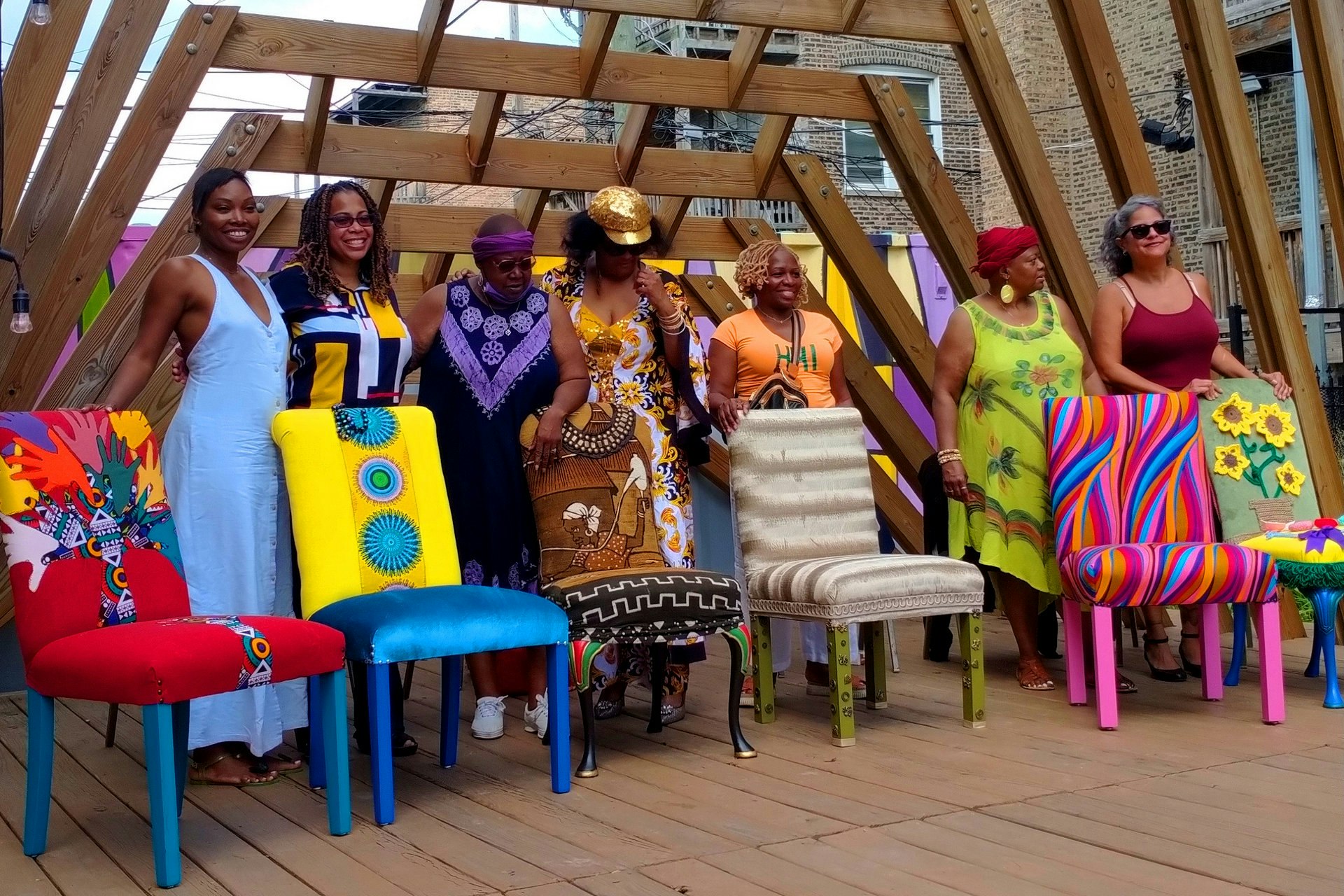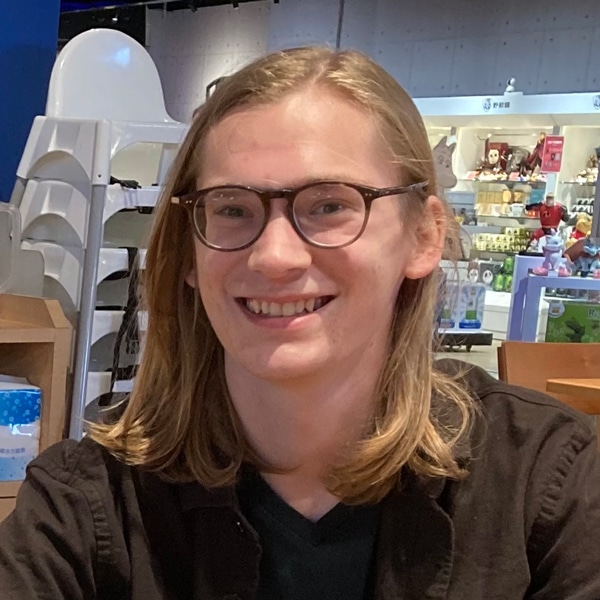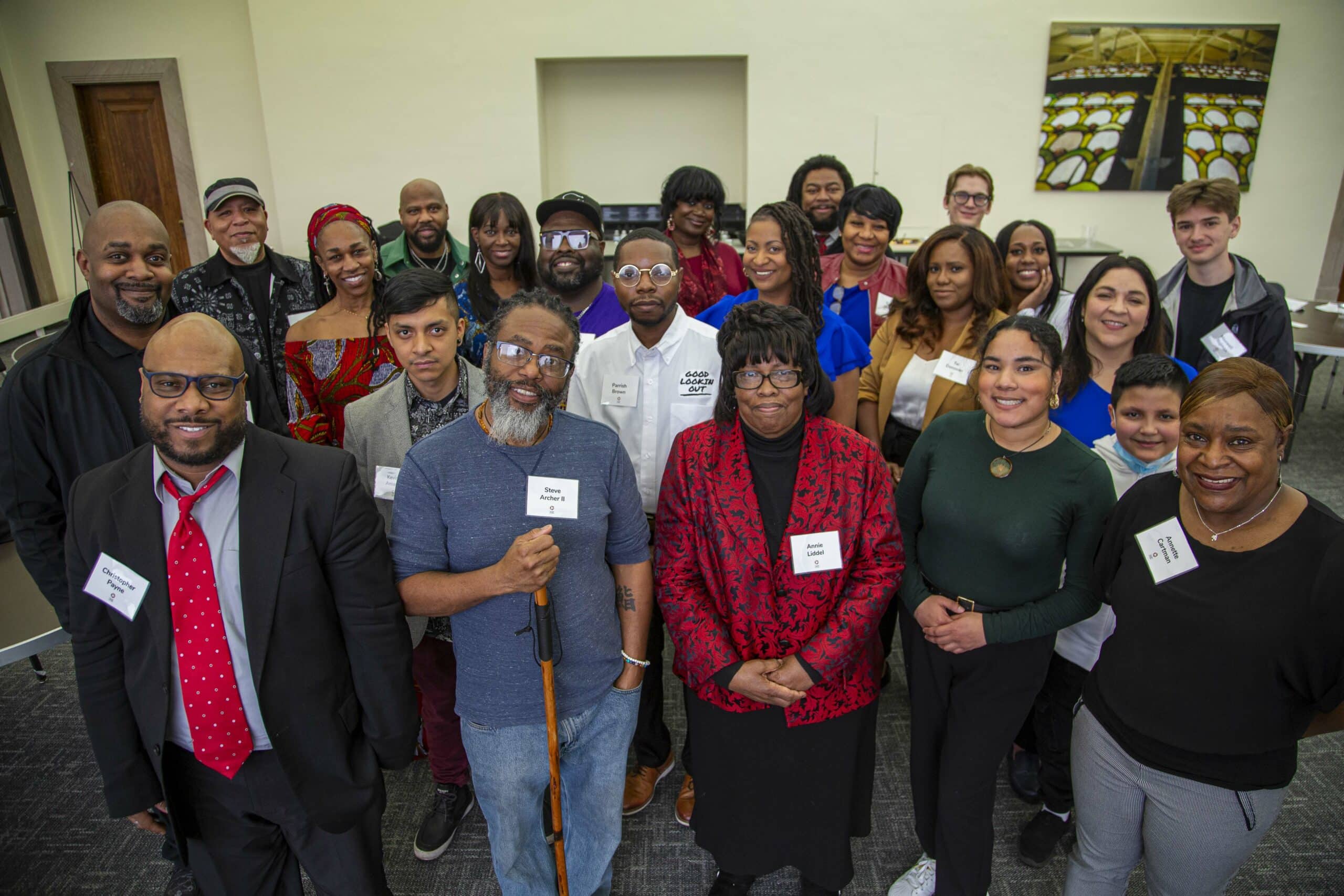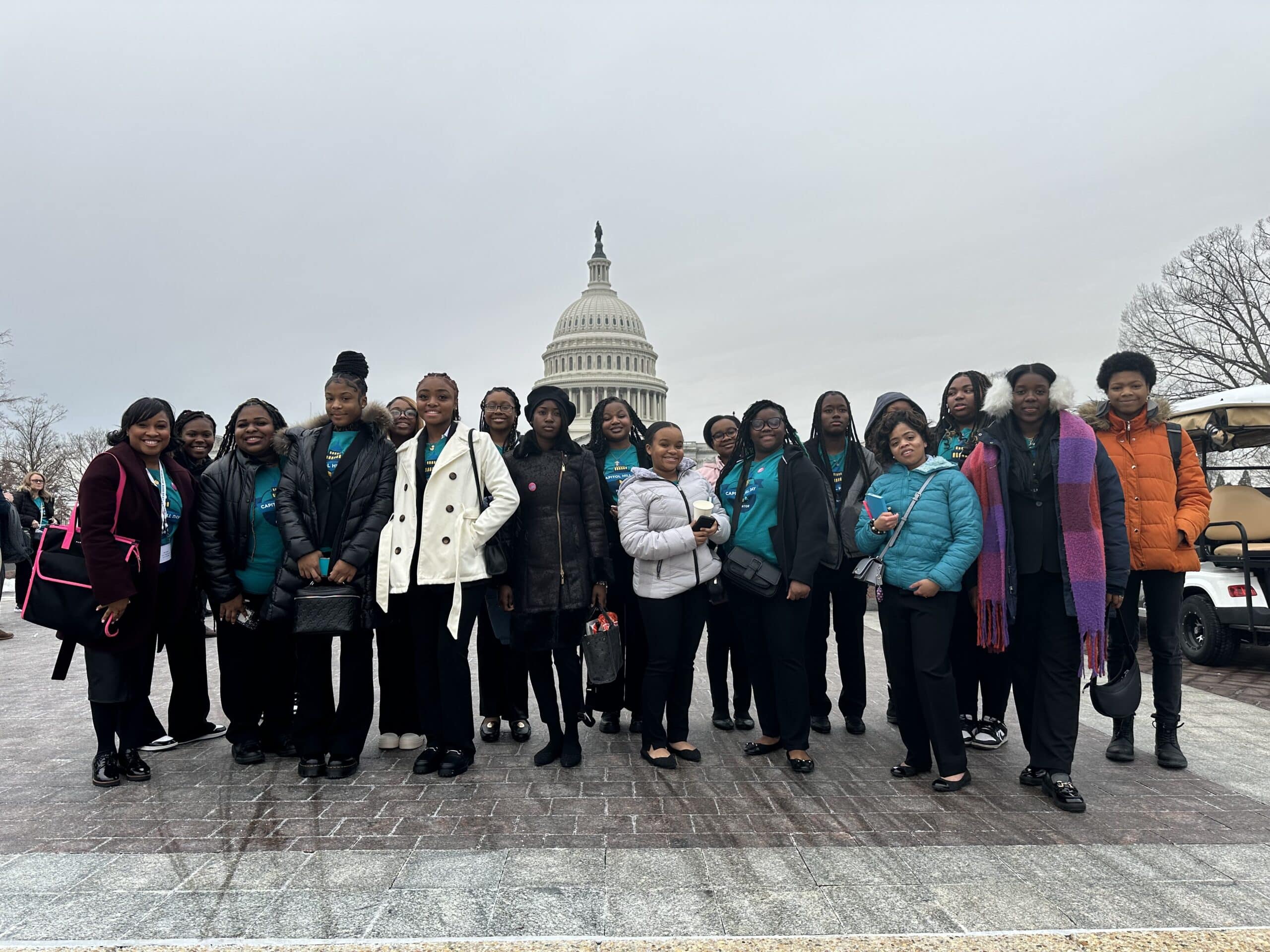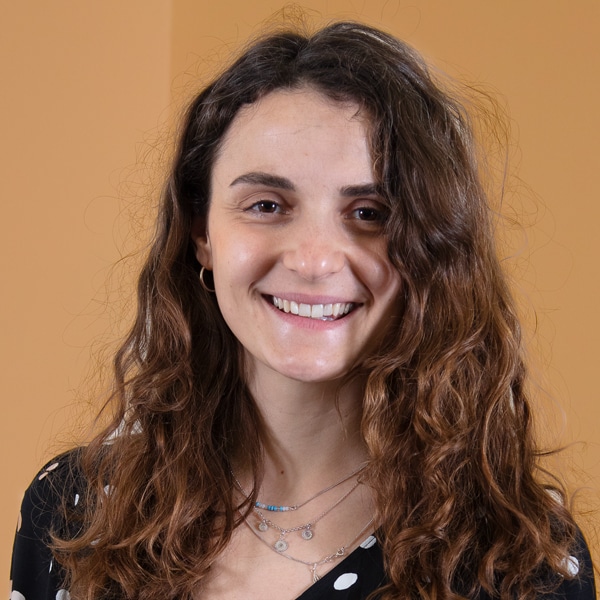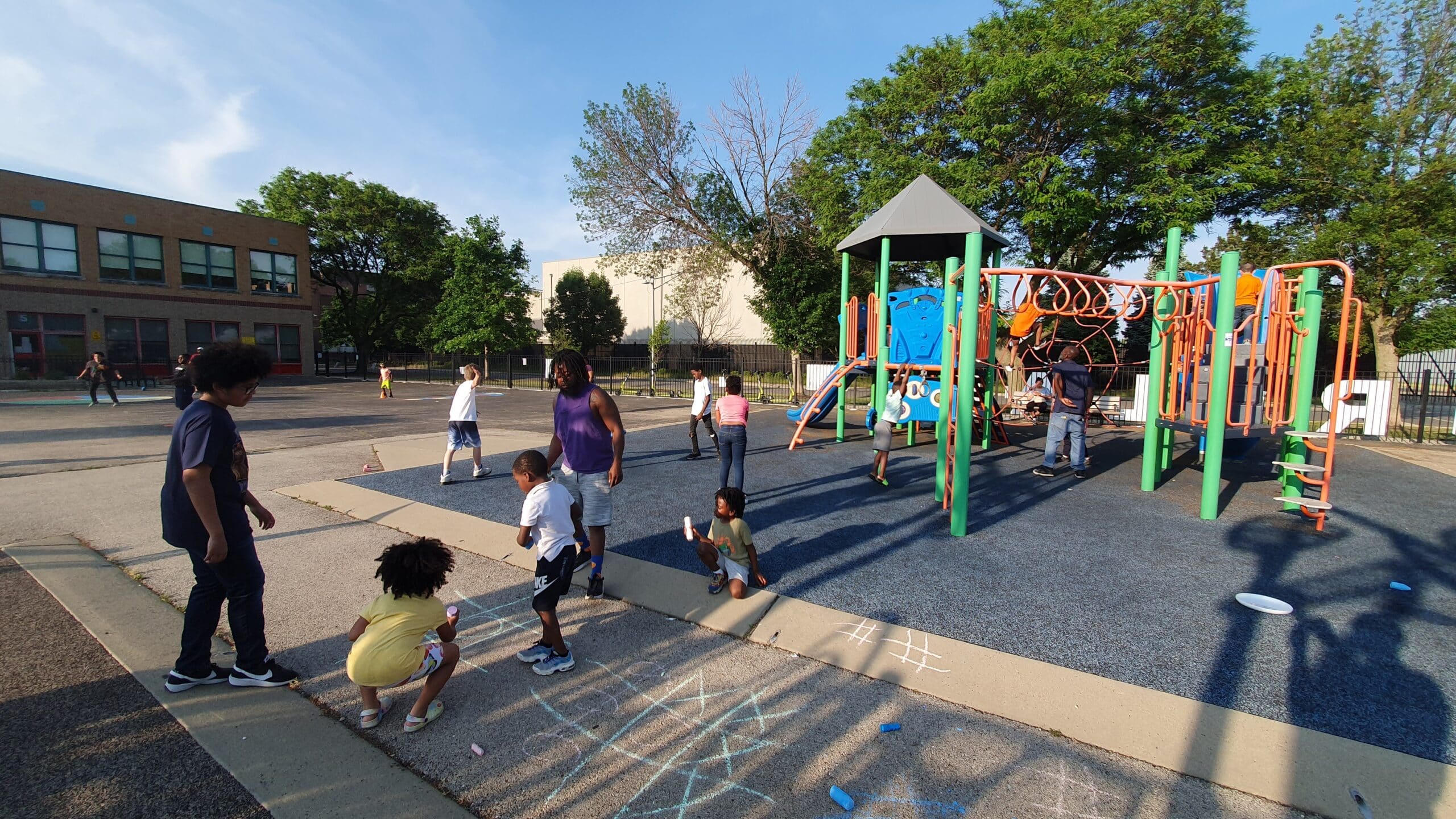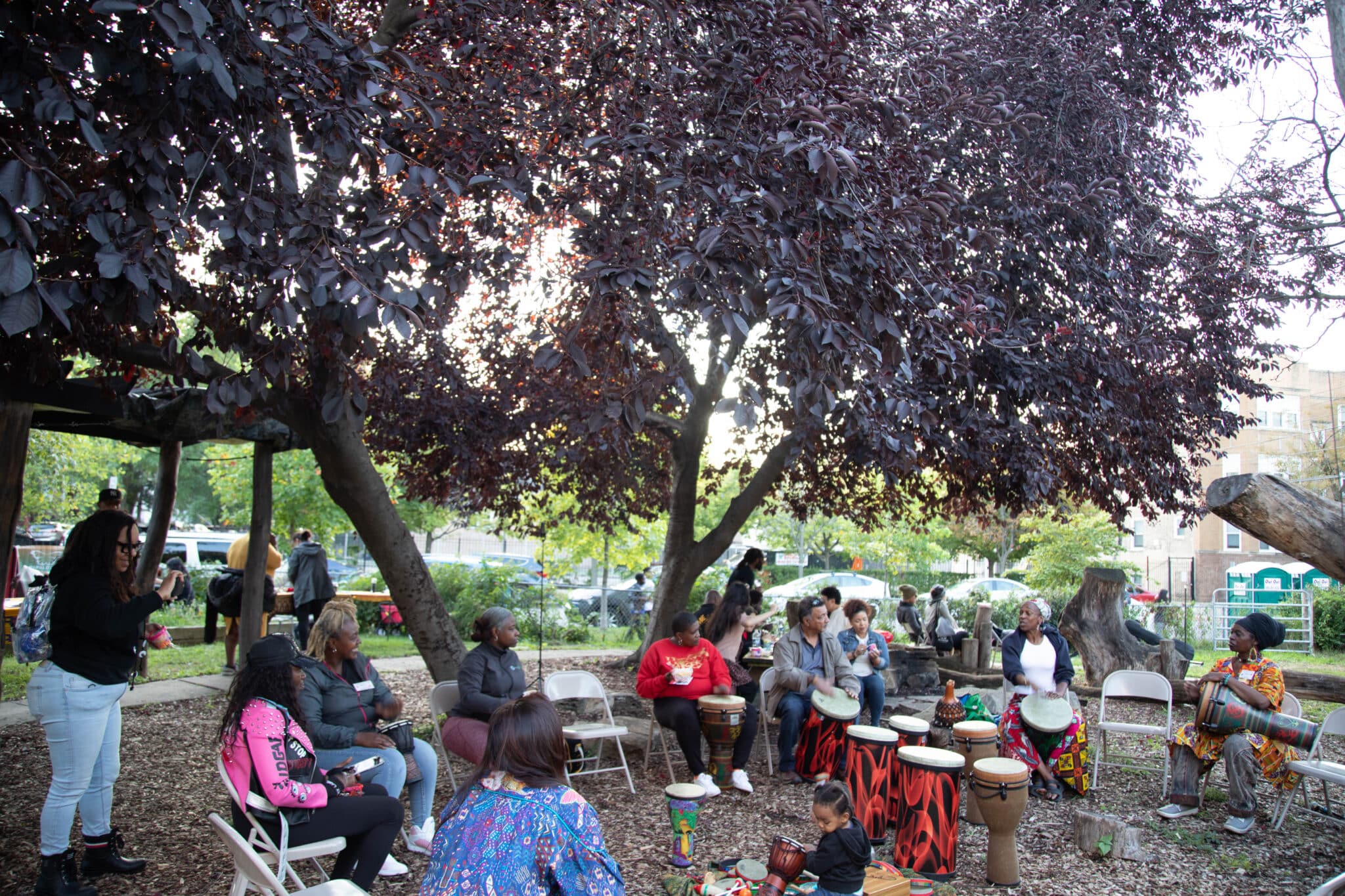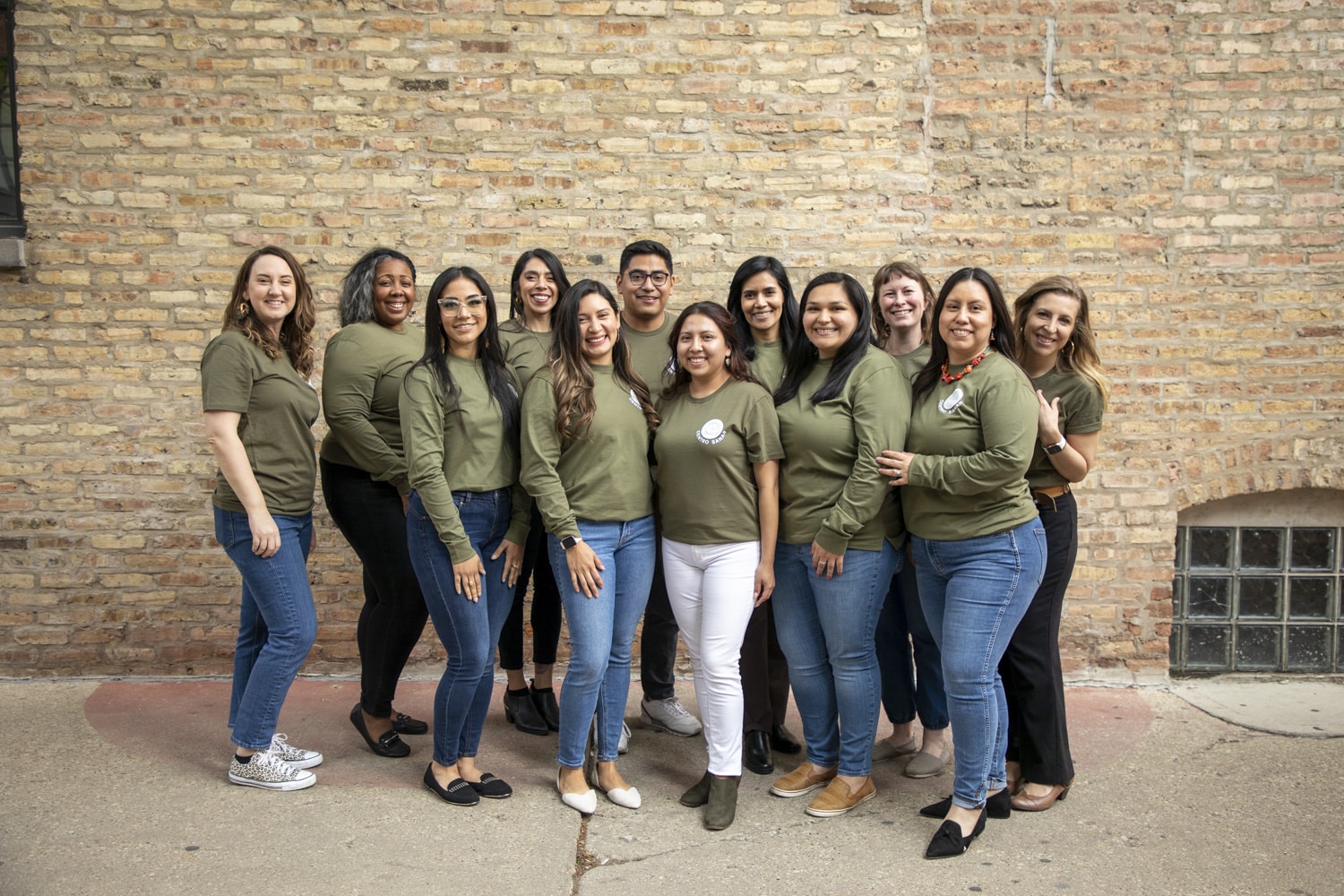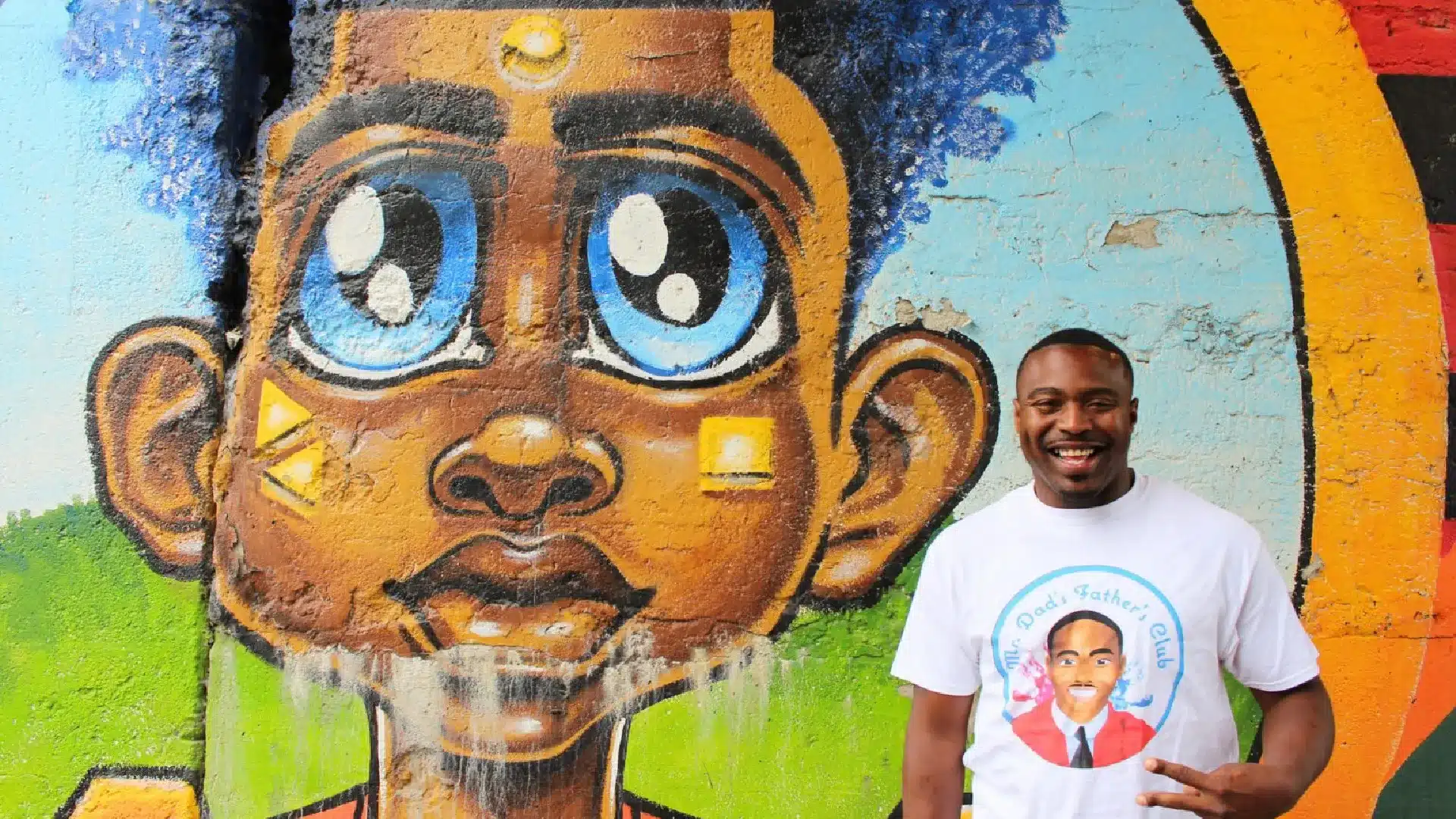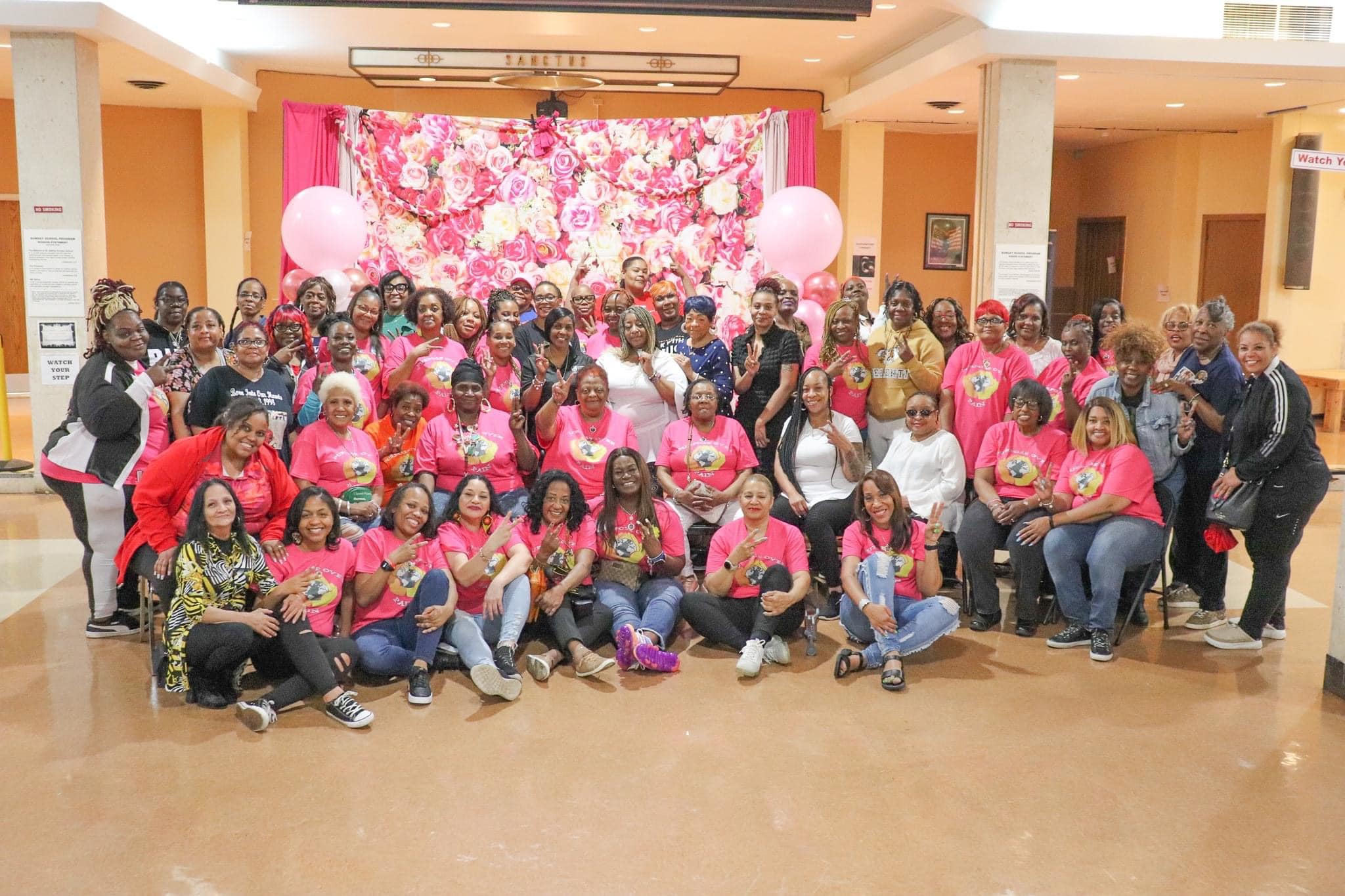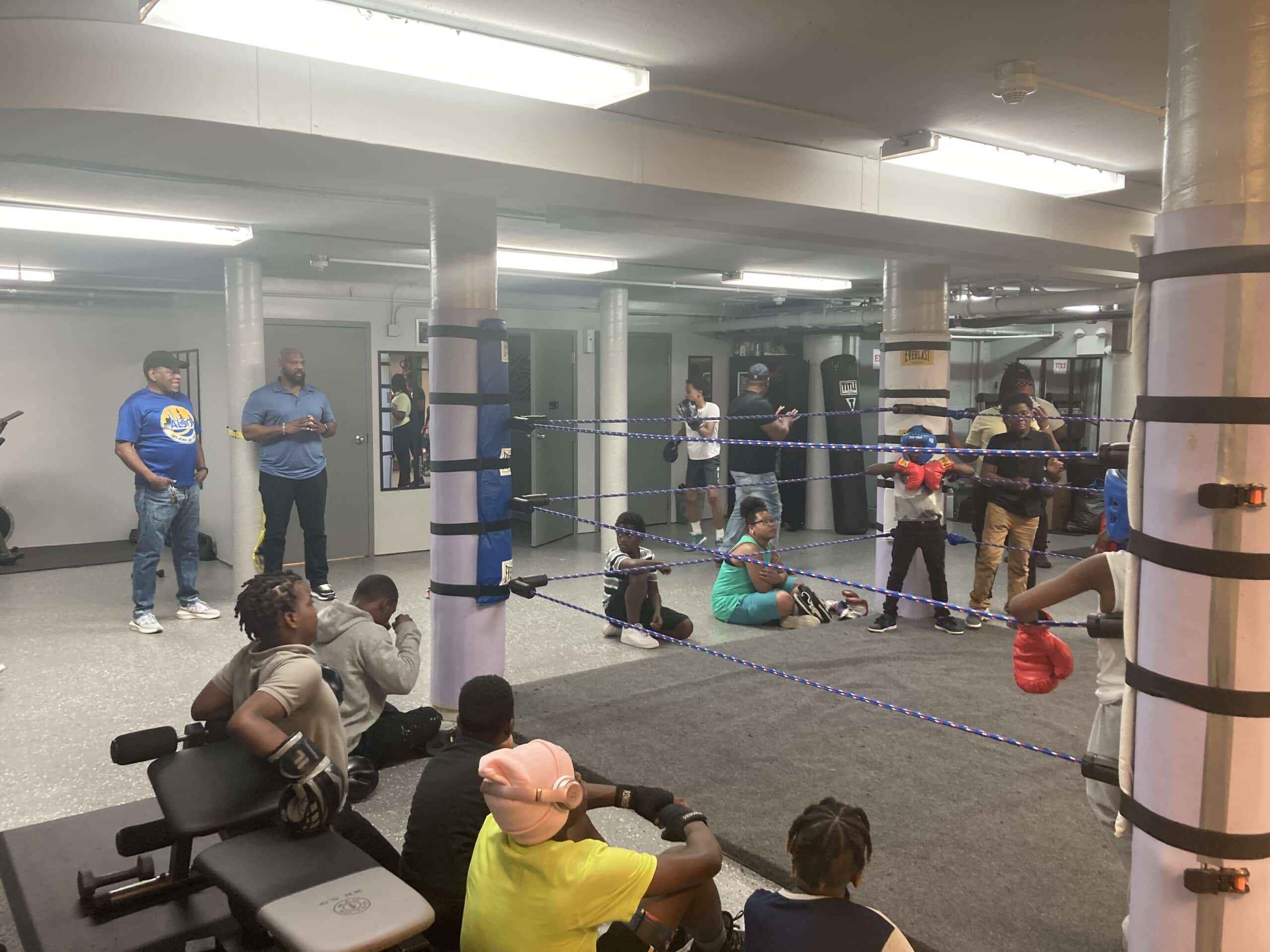Chairs as Activist Art
Throughout the history of the Goldin Institute, many Peace Fellows have used art as a way to bring communities together, reflect, and create. Jamika Smith, a 2022 Chicago Peace Fellow and the founder of Teena’s Legacy, uses a unique medium to promote these kinds of practices, teaching the art of upholstery as a tool for healing and community activism. Recently, Jamika has worked on two substantial projects, collaborating with community members from the Black and Latino community to use re-upholstery as a tool to explore their history and facilitate healing.
Chairs that Explore Black History: Blooming Out of Trauma
For Black History Month, Teena’s Legacy hosted their very first art exhibit, “Blooming Out of Trauma: The Intersection of Upholstery and Activist Art.” The exhibit was hosted at the Marshall J. Gardner Center for the Arts in Gary, Indiana from February 2 through March 8. For this exhibit, Jamika worked collaboratively with community artists to create fourteen works that trace a peoples’ history from the African Empire and slave trade, through Jim Crow and Civil rights eras, to contemporary experiences. Speaking to the collaborative nature of the exhibit, Jamika stated: “I intentionally wanted this to be a collaborative project, so I [brought in] a couple of artists from Chicago, an artist from Hammond, Indiana, and a majority of artists from Gary.”
Blooming Out of Trauma aimed to capture both the struggles and achievements of African and Black History. Speaking to her inspiration for the exhibit, Jamika said: “A lot of my chairs, especially when I do my workshops, are more about purpose driven pieces, designed with intention. This exhibit is what that is, I intentionally designed an exhibit to tell the story of African and Black history using some authentic cloth from Ghana and Mali. The story starts from the birth of slavery in the 1400s all the way up to the present day. The name ‘Blooming out of Trauma’ captures that for well over 400 years there were traumas and struggles, yet there were also triumphs out of those.” Through working with African materials and reflecting on African and Black history, the artists who contributed to Blooming Out of Trauma created chairs that provide a space to process that history.
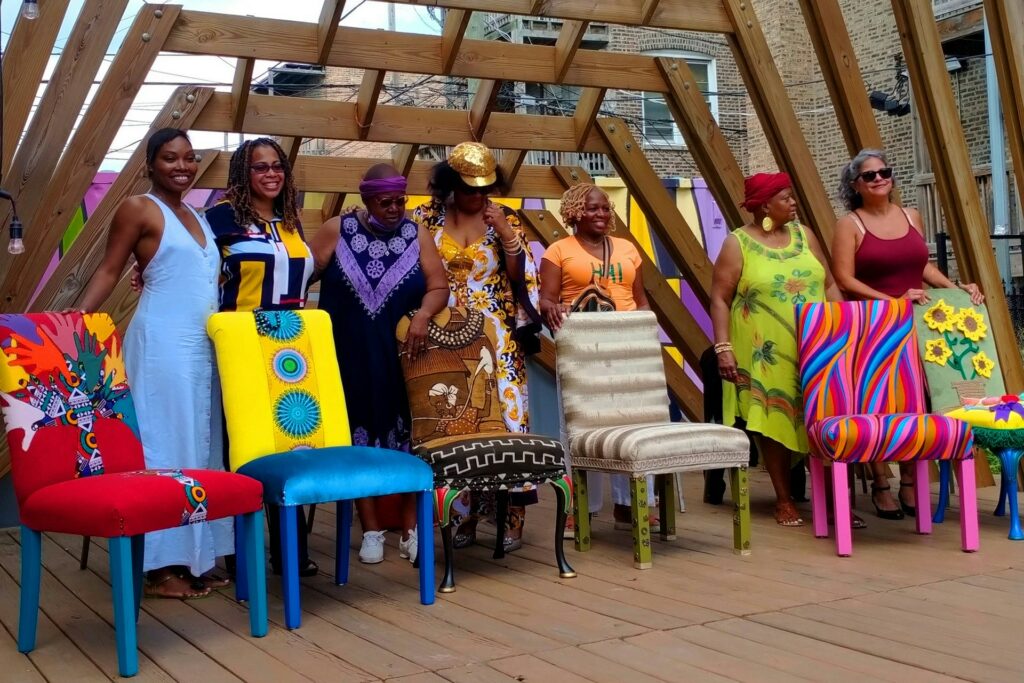
As Jamika and the other artists worked on chairs for Blooming Out of Trauma, they also processed their own personal histories. Jamika elaborates, “I learned more about my history through this project, especially the history that is not taught in schools or books. Even history that our ancestors or family members may have been uncomfortable or ashamed to tell. That history is hidden.” Continuing to reflect, Jamika stated that upholstery teaches: “First, to have patience to assess that there is trauma, and then second to identify and put a name to that trauma, and third, how do you compartmentalize or release that trauma; how do you put it in its proper place.” Through reflecting on personal histories and struggles, Blooming Out of Trauma seeks to allow a space for trauma to be processed.
The way Jamika approaches upholstery centers the experience of individuals and upholstery’s role in connecting groups of people through their experiences. Speaking to the collaborative nature of her work, she says, “It is so much better doing stuff with other people and not solo. You get to learn so much more about individuals’ personalities, passions, desires. When it comes to art, you also learn about their struggles and challenges when it comes to monetizing their art and how challenging it can be to connect their art to the mainstream.” For Jamika, upholstery is a reflective process: “Upholstery can be tedious work, especially since you work with your hands, so students tend to get frustrated through the process, just to come out of the process with a better understanding of who they are as individuals. If you’re impatient with this chair, where else are you impatient? Are you impatient with your health, finances, etc.” Through the process of upholstery, individuals come to a greater understanding of themselves, their history, and their community that can be shared through works of art.
Exploring Assets in the Latino Community: A Seat at the Table
Jamika has also partnered with the Illinois Legislative Latino Caucus Foundation, where she worked with 17 artists from community areas represented by members of the Illinois Legislative Latino Caucus to create chairs representing their community areas on a project called “A Seat at the Table.”. For this project, Jamika joined with Dr. Patricia Novick, a 2023 Goldin Global Fellow, who guided the artists through an Asset Based Community Development training, while Jamika hosted workshops walking the artists through the process of designing and creating a chair that tells the story of their district. Afterwards, the chairs were auctioned at the ILLCF’s annual gala, where $1 million was ultimately raised for their scholarship program.
Artists in the workshop came from multiple generations and represented multiple community areas, but came together to imagine ways in which their communities could be represented through chairs. Jamika emphasized the way the artists were able to join together as a community: “17 artists went into the workshop without really knowing each other that well. And it was an intergenerational group from 16 years old to 65. […] The idea was that even though they did not know each other, they all came into this one space as if they were family.“ Each artist was also allowed their own voice and aimed to capture something about their community. Jamika continued: “Each Chair had a foundation of community, but it was told in 17 different ways. That was the most powerful part about it: it was about community, building, and collaboration, but each one of them had their own separate voice in displaying what it meant for them.”
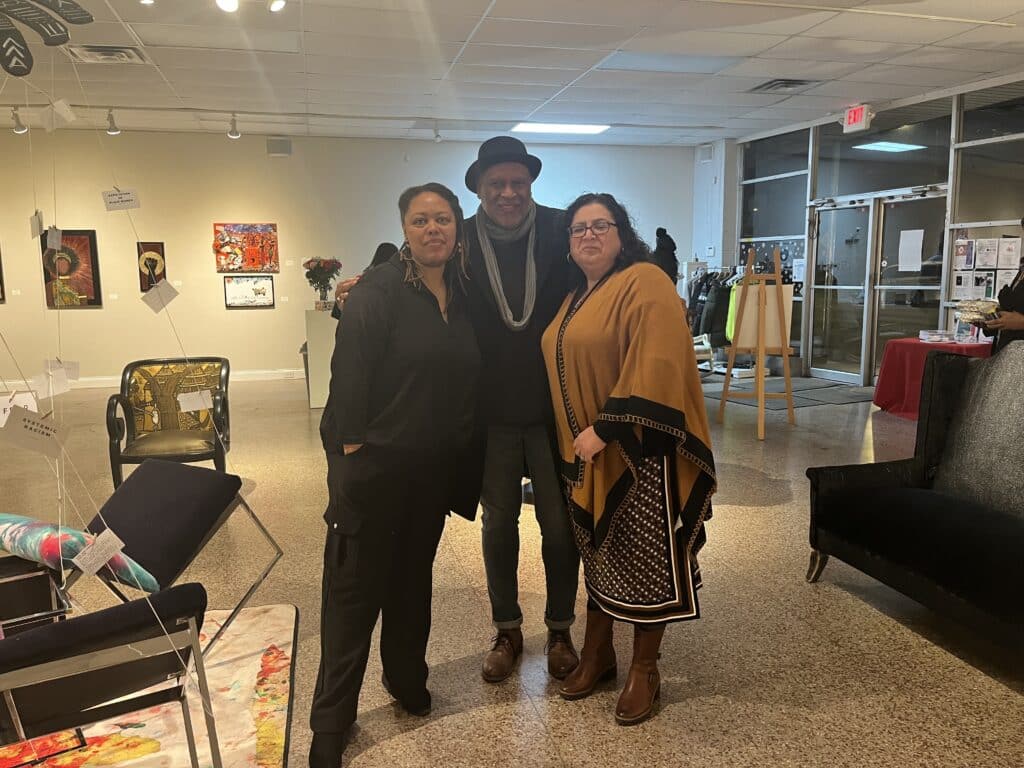
The artists who worked on a Seat at the Table aimed to showcase a variety of Latino experiences that depict a rich culture. Madison Cervantes, created a chair representing the first senate district and notes: “The butterflies I put on my chair represent all of the immigrants within the 1st district. I wanted to use different materials for their symbolic meaning. Latinos, we are everywhere and we know how to use many different materials and we venture out and I just wanted to represent that we are not linear people.” Silvia Morales created a chair for the 23rd congressional district that incorporates items from vendors in her community: “I wanted to include a lot of aspects of our community as hard workers, but also as people, people who need to rest.” Through reflecting on these chairs, both the artists and community members are asked not only to think of the Latino community, but also assets within that community that can be used to build strength.
This year, Jakima hopes to launch another project similar to A Seat at the Table and collaborate with organizations across Chicago. She imagines creating Peace Circles, identifying topics, and addressing current issues to guide upholstery workshops. As seen through both Blooming Out of Trauma and A Seat at the Table, these workshops would provide spaces for artists to work with their communities to explore their histories, identities, and assets.
Meet the 2024 Chicago Peace Fellows
The Goldin Institute invites you to learn about each of our 2024 Chicago Peace Fellows representing 14 community areas across the city. Founded in 2019 in collaboration with the Partnership for Safe and Peaceful Communities, the Chicago Peace Fellows program is the only leadership development program that is built by and for grassroots community leaders on the South and West sides of Chicago.
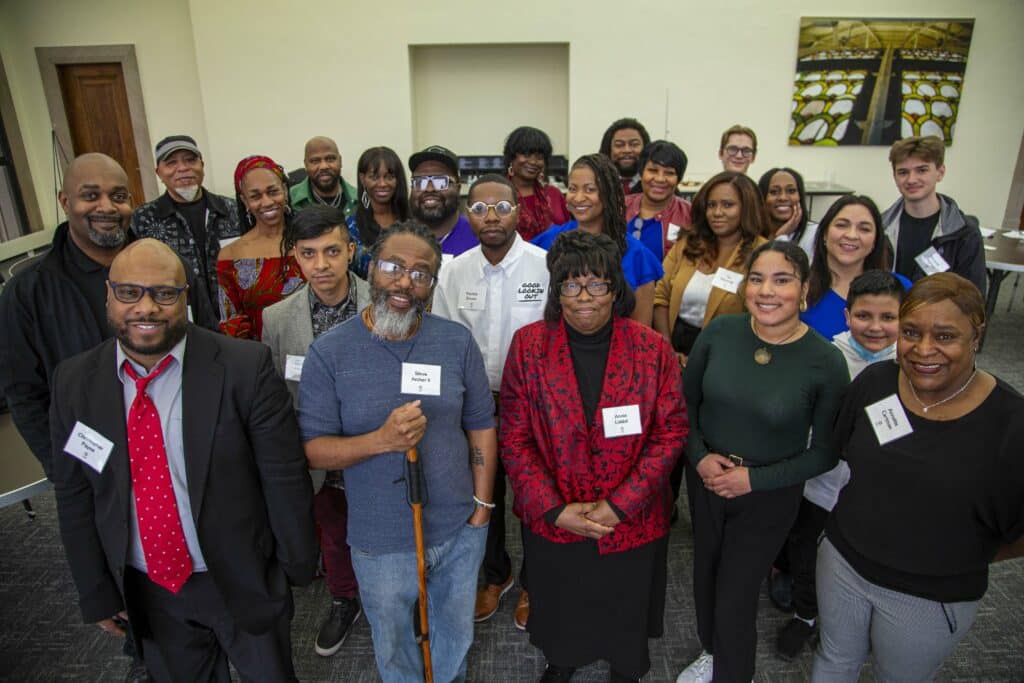
ABOUT GATHER
Peace Fellows participate in GATHER, an online asset-based community engagement course, as well as in-person training, collaborative action projects, and networking experiences with civic leaders, academic researchers, and policy makers. The Chicago Peace Fellows reduce violence by building relationships, engaging youth, collaborative peace building projects over the summer and by creating new networks among residents, families, schools, and nonprofit organizations.
The Fellows are learning together through GATHER, which is both a mobile platform for shared learning and a curriculum for people who want to build on the talents of their neighbors and the assets of their communities to make real and lasting change. Gather Fellows learn and work together through an innovative curriculum that comes pre-loaded on a tablet device with all the connectivity, materials, videos, practices and tools necessary to provide a mobile classroom and toolkit for community leadership.
The Chicago Peace Fellows project connects and equips cohorts of past grantees of the Chicago Fund for Safe and Peaceful Communities to reduce violence and promote peace. The 2024 Chicago Peace Fellows is the sixth all-Chicago cohort to utilize the GATHER platform, an online learning hub built by the Goldin Institute to empower grassroots leaders.
The Chicago Peace Fellows will engage in a 30-week course of intensive shared learning as well as group projects, culminating in a graduation event in November, 2024. The curriculum has been designed in collaboration with the grantees themselves, based on their practical knowledge and hard earned wisdom, with input from a wide range of civic leaders. Fellows will reflect on their past summer work, identify successes and lessons learned, and improve their abilities by sharing strengths and learning new skills.
The Goldin Institute and the Partnership for Safe and Peaceful Communities have aligned missions that value authentic community leadership. The Chicago Fund is uniquely effective at finding motivated problem-solvers and community-builders. By connecting Chicago leaders through GATHER, their efforts to nurture safer and more peaceful communities will be more effective, interconnected and lasting.
OUR PARTNERS
A special thanks to the Chicago Community Trust, the Conant Family Foundation, the Frankel Family Foundation, the MacArthur Foundation, the Polk Bros. Foundation, the Racial Justice Pooled Fund, the Seabury Family Foundation, and the Partnership for Safe and Peaceful Communities for making this program possible.
To follow along the learning journey with the Chicago Peace Fellows, please sign up for our newsletter and follow up on Twitter, Facebook and Instagram.
Civic Engagement Program from Ladies of Virtue Will Empower Black Girls
Jamila Trimuel, the Founder of Ladies of Virtue (LOV) and 2019 Chicago Peace Fellow, speaks to the Goldin Institute about the recent funding that LOV received from the Girls Opportunity Alliance, a program of the Obama Foundation, for their Fannie’s Fight for Freedom Program. This innovative civic engagement program is awarded 50 thousand dollars to launch new LOV Clubs in the South Shore community and support their annual Black Girls Rest event at South Shore High School.
Trimuel elaborates on how this initiative supports girls in Chicago, acknowledging they are powerful change agents deserving of their own space in the community. She highlights how this program encourages girls to fight for what they are passionate about and encourages them to vote and be a part of democracy.
She also reflects on her participation in the Chicago Peace Fellows, emphasizing meaningful cooperation that originated from this experience as a symbol of how Goldin Institute connects activists and creates bridges between them.
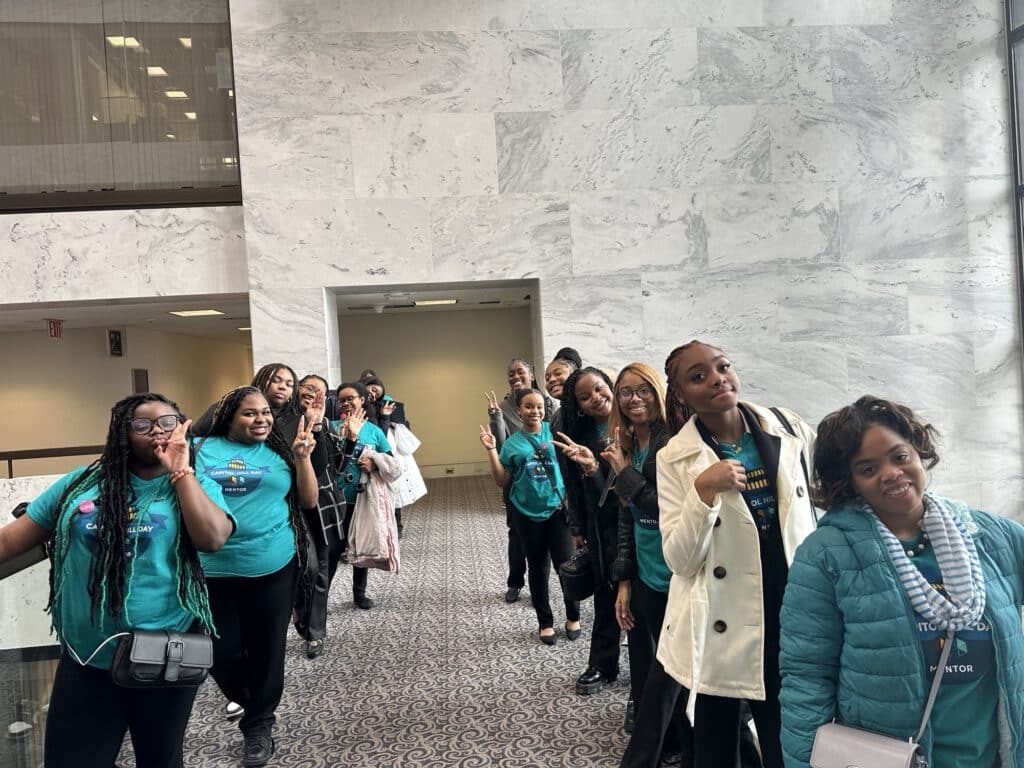
A Program Strengthening Girls’ Voices
There are three parts of Fannie’s Fight for Freedom Program: Workshop, Capitol Hill Day in Washington D.C., and creating awareness via social media. “In the workshop, our girls had the chance to watch a documentary about Fannie Lou Hamer, and they had the opportunity to speak to women who are fighting for issues in our community.” Jamila says.
The workshop was a well-crafted and thought-provoking event that significantly impacted the attendees. The icebreaker activity and documentary screening of Fannie Lou Hamer (1917-1977), an African American civil rights activist on which the program is based, were engaging and informative. “Fannie Lou Hamer was someone who fought for women's rights, and we wanted our girls to be aware of their history and some of the struggles that black women had to go through to be where we are today.”
"We heard from many girls that this was their first time hearing of Fannie Lou Hamer and that they like hearing and learning more about black history and women’s rights activists. They also highlighted they are positively impacted by learning about the history of our leaders."
-Jamila Trimuel
The second part of this program was traveling to Washington, D.C., where the participating girls met with elected officials and representatives from their states. Many of the girls had never been to D.C., and visiting historical landmarks and sitting in elected officials' offices was a significant experience. The three meetings successfully introduced LOV as a leading Chicago-based mentoring organization for Black girls, allowing the youth the space to advocate for mentorship. “We were honored to be present and be a representative of all youth voices in Illinois.” Jamila says. The last component is the leadership projects, where 26 girls from Chicagoland, most from the South, will work on some issues they are passionate about.
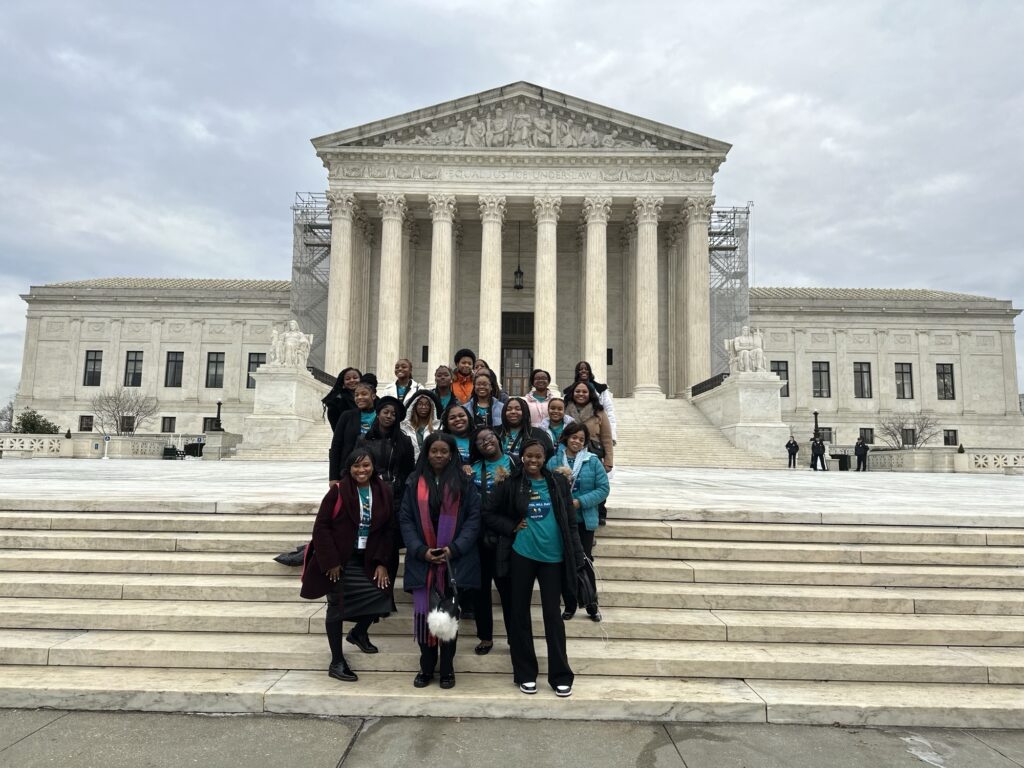
How Ladies of Virtue is Addressing Women’s Challenges
For more than 12 years, an essential aspect of LOV’s work and activism has been empowering Black girls in some of Chicago’s most under-served communities. While talking about some of the most pressing issues and challenges faced by women in Chicago nowadays, Jamila also elaborates on what LOV is doing to address those issues.
"One of the issues that black girls face is high disciplinary and suspension rates in Chicagos’ schools. Further, among these challenges stand depression and social anxiety. We are combating these issues in various ways. One is by incorporating mental health workshops in every program we offer, free of charge. We also offer one-on-one as well as small-group therapies."
-Jamila Trimuel
She further talks about how mentorship opportunities they offer, one-on-one and group mentoring, have proven to bring benefits. “We know mentoring encourages girls to go to school to become more successful. When they see women who look like them, they know that they too can achieve their goals.” Mentoring includes someone checking up on the girls and helping them navigate their career opportunities. “Mentoring is where the girls engage their mentors. They also have mentors outside the session. They can go to games and participate in activities outside our organization.”
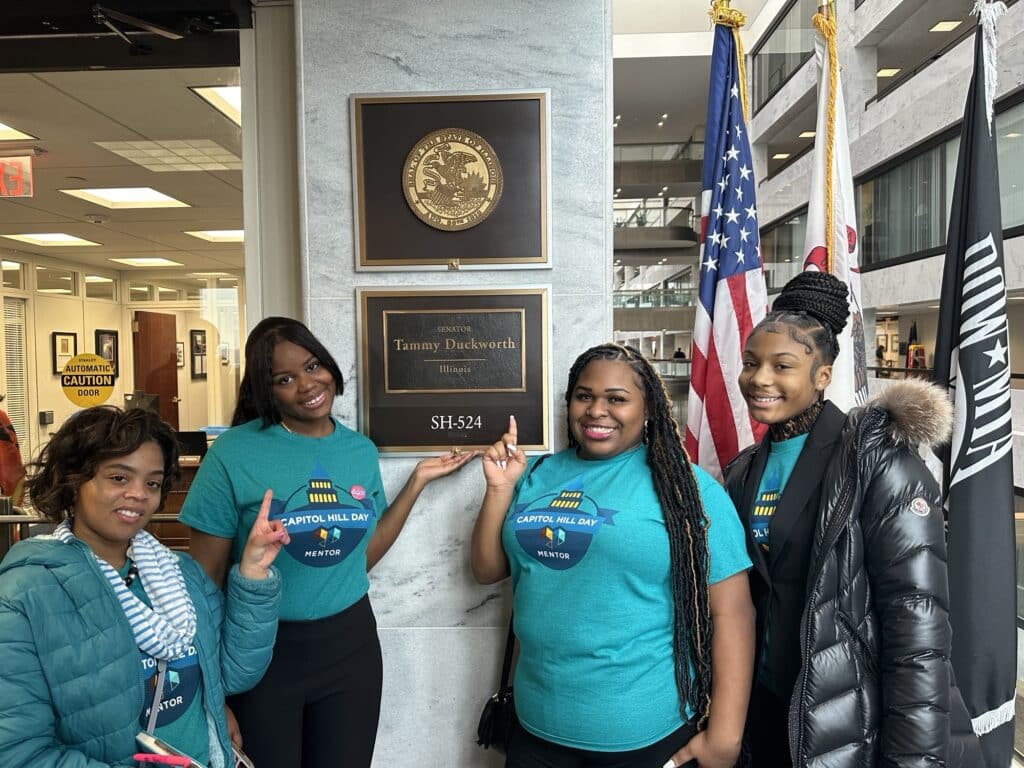
Chicago Peace Fellows - A Meaningful and Lasting Experience
When speaking about her experience as a Chicago Peace Fellow, she recalls a partnership that stemmed from her time as a Fellow. “One thing I enjoy even to this day is that we partner with the Imani Community Development Corporation for our LOV Day initiatives. This is an event where we provide self-care experiences for Black girls in the South Side of Chicago.” Jamila met Dawn Hodges, Executive Director of Imani Community Development Corporation, during their participation in the 2019 Chicago Peace Fellows program. “My time with Goldin Institute was very comprehensive. Goldin Institute does fantastic work with NGOs. During the Chicago Peace Fellowship, we had the chance to meet other non-profits funded by black and brown people who are actually in the ground making an impact.” She says this focus on grassroots leadership was something different from the other fellowships she was part of.
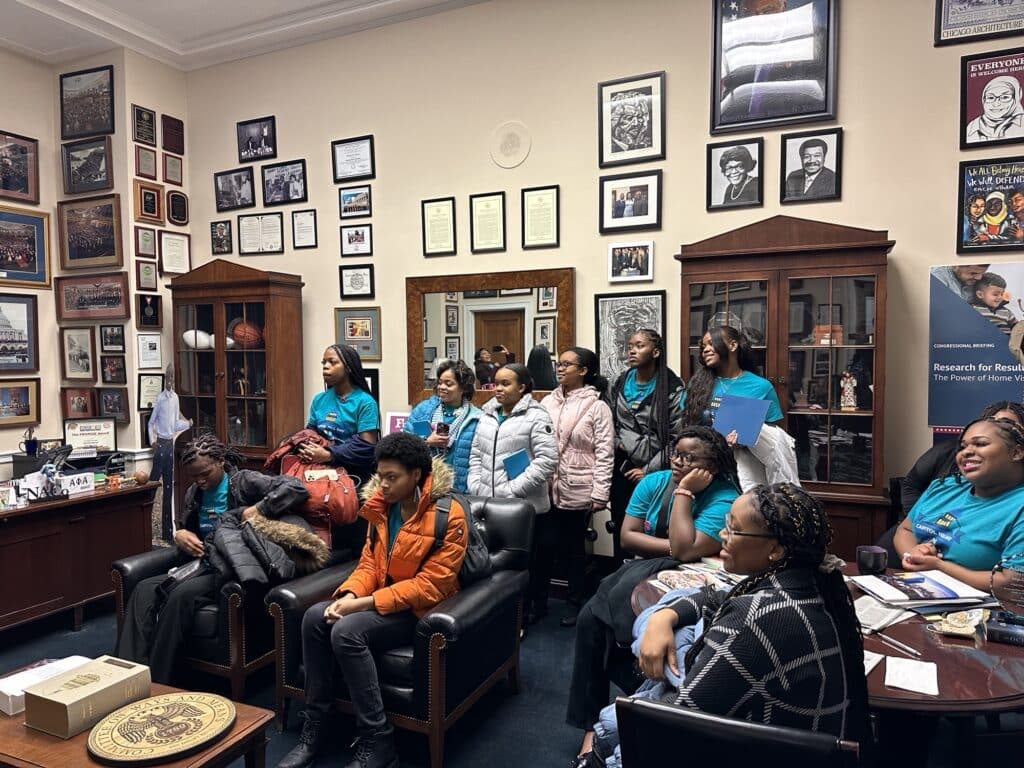
Click here to donate now and support the community activism of LOV.
Storytelling to Build Community: 2023 Peace Fellows Hold Speak Your Peace Workshop
Storytelling serves as an important medium for many Chicago Peace Fellows to raise awareness and promote solutions to problems that they face in their community. On October 21, the 2023 Chicago Peace Fellows hosted the Speak Your Peace workshop, dedicated to building power and community through inter-generational mixed-media storytelling. The event was held at the Chicago Center for Arts and Technology (CHICAT) on the West Side of Chicago. Peace Fellows on the Speak Your Peace team included: Nachelle Pugh, Antwan McHenry, Kanesha Walker Amaro, Carlil Pittman, Devonta Boston, Alexandra Auguste, Zahra Glenda Baker, Diane Deaderick DeMarta, Ceola Henderson-Bryant, and Lauryn Collins.
Speak Your Peace was one of a series of Summer Projects organized and hosted by the 2023 Chicago Peace Fellows to apply lessons learned through the GATHER curriculum to build peace within their communities. Peace Fellows participate in GATHER, an online asset-based community engagement course, as well as in-person training, collaborative action projects, and networking experiences with civic leaders, academic researchers, and policy makers throughout the year. These lessons culminate in a series of planning workshops where Peace Fellows can apply their newly learned skills and connections to a summer project that builds on the talents of their neighbors and the assets of their communities to make real and lasting change.
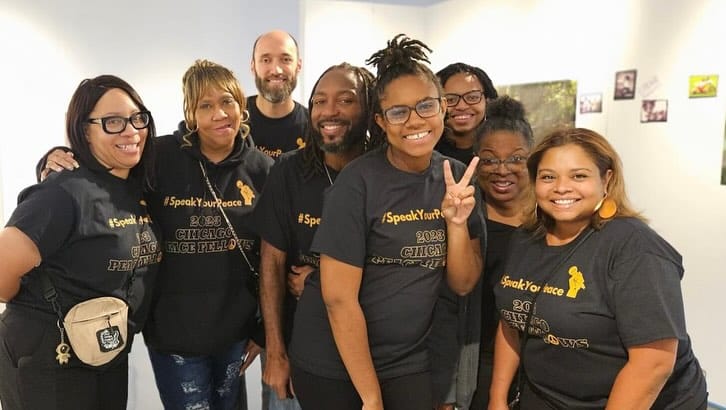
Throughout their fellowship, the 2023 Peace Fellows had a series of planning meetings where they set the scope of their Summer Projects: determining which beneficiaries to target, choosing potential community partners, and drafting a program. After determining projects and team members, the Peace Fellows met on their own to plan. “We were all sitting at the table and picking these projects, and our group felt it was really important for people to tell their story".
"In our community there are so many different things that go on, some of which are great and some of which are harmful and violent. We wanted to give people an opportunity to think about those things so that we can build on their experiences and make changes.”
- Nachelle Pugh
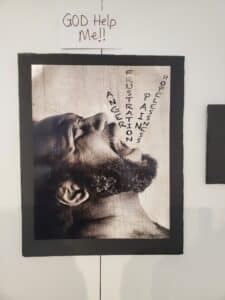
Centering Community Voices
The Speak Your Peace team sees storytelling as a way to show people from outside of their communities the challenges and triumphs of their neighborhoods. Nachelle elaborates, “Just looking [from outside] and trying to decipher what is going on is different from someone telling you what is going on. I think that’s what we were able to do with the storytelling at this event.” By providing a workshop and creative space for community members on the South and West side, Speak Your Peace aimed to center voices that are often ignored.
“To me it’s important to speak your peace, because if you don’t speak it, someone else will.”
- Kanesha Walker Amaro
By focusing on affirmative storytelling and highlighting the voices in the community, Speak Your Peace aimed to combat harmful narratives that are imposed from the outside.
Storytelling at the workshop showcased a variety of talents within the community with photography, art, poetry, music, and film working in unison to express a variety of voices. Hip hop artists, filmmakers, poets, and photographers from the community all had opportunities to present their talents. One of the featured artists was a filmmaker who started making films at the age of 17. At the event, the audience watched her documentary, filmed 7 years ago, which captures instances of police brutality that were spotlighted prior to the Black Lives Matter movement and shows the filmmaker’s view as an insider witnessing the violence. Another artist was a poet who used the space to share poems about her refusal to let any disabilities define her and allow her to center her experiences through poetry. The stories shared at Speak Your Peace were inter-generational and mixed-media, allowing for new connections to be generated between a range of communities.
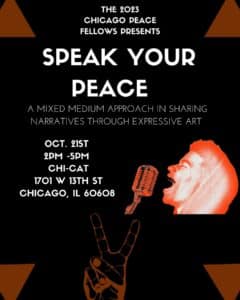
Mixed-Media Storytelling Build New Connections
Many of the Peace Fellows involved also had an opportunity to showcase their own artistic talents, which often do not have a chance to take center stage in their community work. For instance, Antwan McHenry curated a photography exhibit that showcased a variety of artists as well as his own work, which included a series of self-portraits he took during the height of the COVID-19 pandemic. Nachelle expressed admiration for his photographs, “Antwan, is an amazing photographer. […] Those pictures told a lot of stories of what was going on in his life, but probably also the lives of many others who were self-isolating. It was depression, it was confusion, it was chaos, it was sadness, it was the happiness at the end of the tunnel. All of those photos told the story of his experience.“ Kanesha, another 2023 Peace Fellow, also had the opportunity to share her poetry and bring in other local poets to perform.
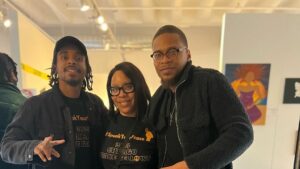
Speak Your Peace allowed for new connections to be made between artists and community activists across the South and West Sides. Reflecting on Speak Your Peace, Nachelle said that the most important thing accomplished was: “Building relationships with the community that was there."
"Working with the folks in our group, we got a chance to know each other, for real."
- Nachelle Pugh
We had been doing different workshops and activities, but we never really had a chance to [...] do the work that we do together and watch each other shine, and to be able to make suggestions with our personal experiences to help each other and make this event amazing. I think that’s the most important part and what I loved the most. Once we were done, everyone was like ‘yeah we gotta do this again and make it into something we do regularly’”. After the event, artists continued to connect and plan collaborations that will continue to center lived experiences for the world to experience and reflect on.
How the Island is Reactivating Their Public Spaces
This summer, the Island Civic Association worked with young people in the Island neighborhood of Austin to reactivate a playlot owned by G. R. Clark Elementary School as a public space. Nate Tubbs, a 2023 Chicago Peace Fellow and president of the Island Civic Association (ICA), was heavily involved in organizing the project. The work of Nate and the ICA aims to create a more connected, inclusive, and thriving community in the Island. In an effort to activate gathering spaces, ICA has been working with G. R. Clark and young community members to host Playlot Nights at the G. R. Clark Playlot. These events aim to attract attention towards creating more public outdoor spaces and promoting a healthier and more cohesive neighborhood.
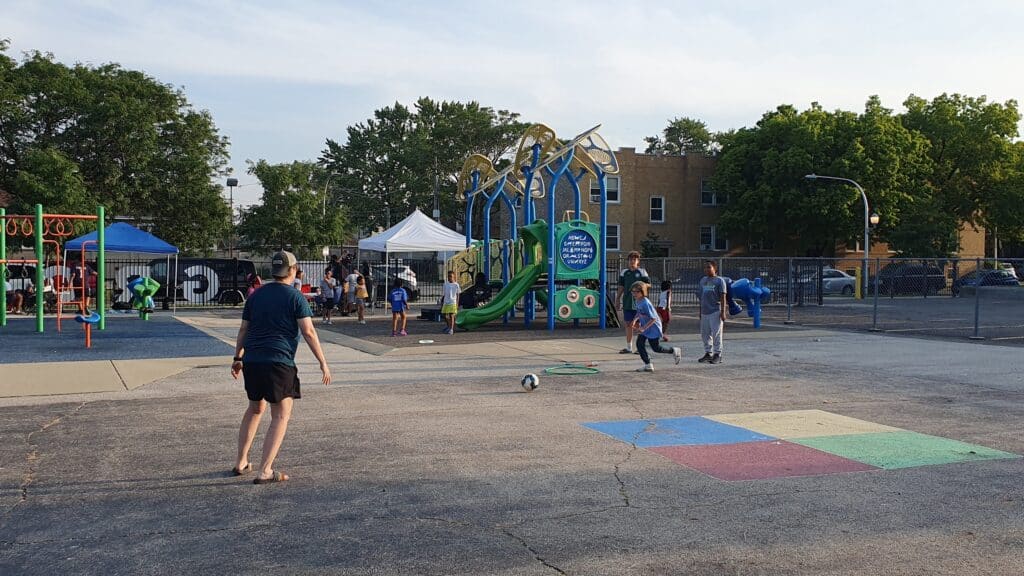
The playlot provides a large open space for people of all ages to utilize.
The Need for Public Space
Currently, the Island lacks outdoor spaces for young people and families to gather. The ICA has identified this as a problem that often causes people to have to leave the neighborhood for recreation. Nate comments, “The Island is a small pocket of the Southwest Austin community. It is a great little area, but it is kind of land-locked. This means a lot of people have to leave the neighborhood to go to a park or playground.” One way the ICA has worked to solve this problem is by activating existing areas to serve as public spaces in addition to their current uses.
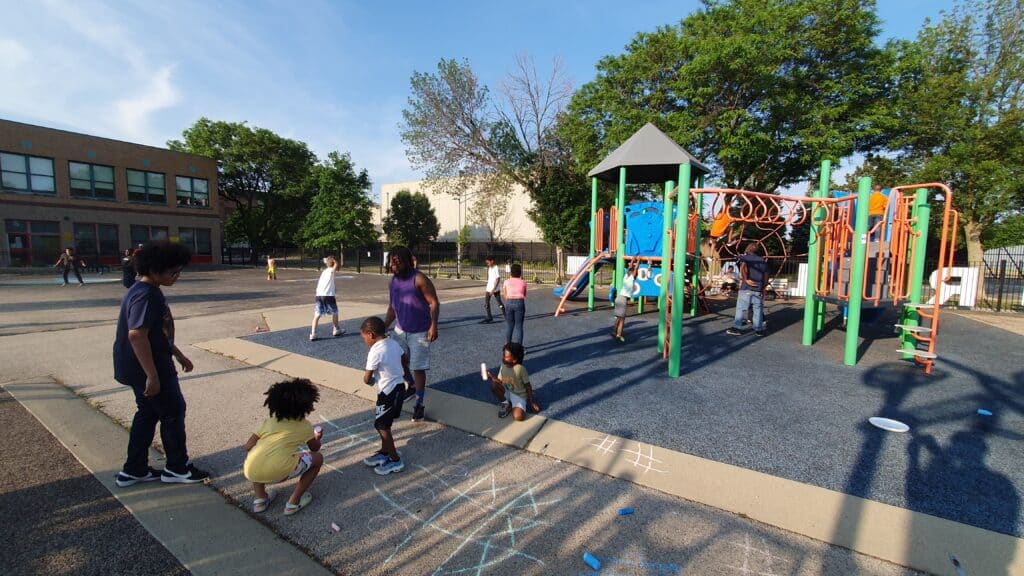
Playlot Nights provided an opportunity for people to gather in a public space that was previously closed outside of school hours.
In the past, the neighbors within the Island community have worked together to activate vacant spaces through community partnerships, however the Playlot project seeks to activate existing space on a larger scale through partnership with G. R. Clark. Island residents previously created a Nature Play Garden as an intergenerational outdoor space on a vacant city lot. However, the ICA’s work on the G. R. Clark Playlot Project focuses on creating a larger space where community members can gather for larger events or play sports and is dependent on working cooperatively with G. R. Clark. Up until this point, the G.R. Clark playground has been regularly locked outside of school hours. Many community members have asked whether it can be opened more regularly. In response ICA has been in discussion with the school about how they can activate the space for community events.
The Playlot Project
To show community support for opening the playlot to the public, the ICA and the G. R. Clark Local School Council have invested in its renovation alongside young people and community partners. The 'Playlot Project' has aimed to center the voices of the young people who plan to use the space in discussions about the playlot’s future.
Improve Existing Facilities
Students provided their ideas for improving the playlot and one of their primary concerns was to renovate a fence outside of the school that had become an eyesore. Community members and students worked together to install garden beds, repaint the fence, and add new plants and benches. Their work was aided by partnering with the humanitarian organization Convoy of Hope, as well as John Burns Construction and Christy Webber Landscaping Company which both provided employee volunteers to help improve the space. This spring, students added new signage and lettering to the fence along the playlot. These efforts to beautify the space, showed ownership, and demonstrated that there are people who care and are working on the space.
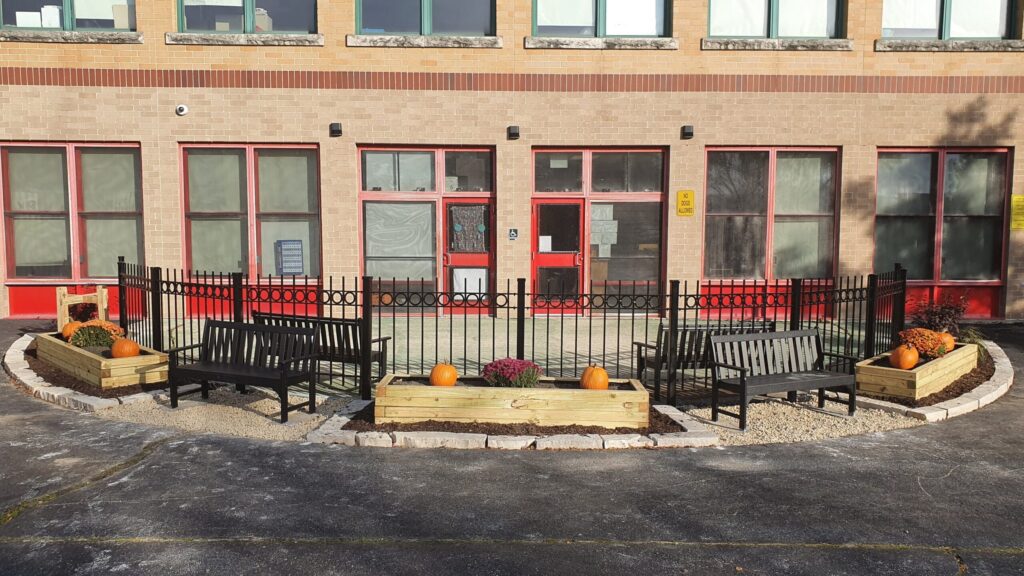
Increase Access
Following the renovations, the Playlot Nights acted as a proof of concept that the community is invested in reactivating the space. Playlot Nights were held on first Fridays through the summer, in June, July, and August when kids of all ages came together to play. The events incorporated activities for all ages such as chalk drawing, kickball games, music, and cold drinks. Nate noted that each night attracted new crowds. “I think that’s the beauty of doing something outdoors. While some people came from getting flyers and emails, other people were just walking their dogs or riding their bikes and stopped by. Some people drove by and did a double take because they weren’t used to seeing people using the space. So it was really a positive thing with great energy.”
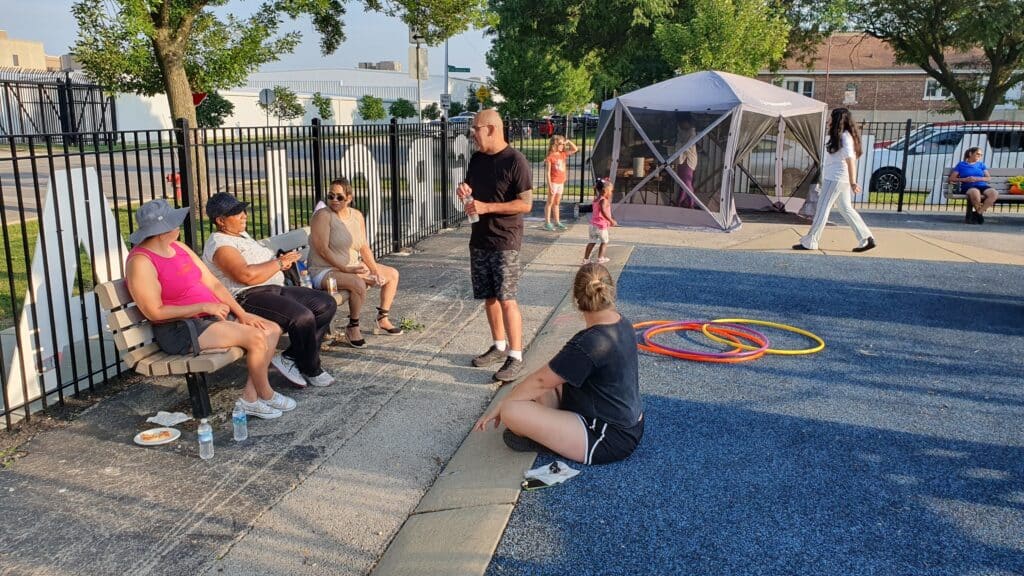
The input of young people is central to the community’s plans for the future of the Playlot project. Six young community members between the ages of 12 and 15 were commissioned by the ICA as Youth Ambassadors and helped organize the Playlot nights. Each Youth Ambassador lives within the Island neighborhood and worked alongside the community to plan the Playlot Nights in exchange for stipends. Youth Ambassadors planned events, distributed flyers, and administered games and activities. By showing that young people are capable of taking action to plan the future of the playlot and administer programs, ICA hopes to generate more community involvement and incrementally work towards a larger scale transformation of the space.
"The Playlot Nights brought the community together to have fun and opened the playlot to connect the community as a whole."
- Henry Ellis, ICA Youth Ambassador
The Playlot Project demonstrates the change that happens as a neighborhood explores their strengths. The Playlot is not something new to the Island neighborhood, but is an asset that is being reactivated through community involvement. Looking towards the future, the ICA aims to continue to maximize its impact in the community through collaboration and investment in existing resources.
2023 Peace Fellows Host Healing Oasis in West Humboldt Park
On September 17, the 2023 Chicago Peace Fellows held their first summer project, Healing Oasis, at the Children’s Garden of Hope in West Humboldt Park. The event emphasized healing on both an individual and community level, bringing in artists, musicians, healers, and other vendors together with the West Humboldt Park community.
Peace Fellows on the Healing Oasis team included: Antwan McHenry, Beria Hampton, Diane Deaderick DeMarta, Ernest Dawkins, Jonathan Johnson, Nate Tubbs, Yaritza Guillen, and Zahra Glenda Baker. Healing Oasis was part of a series of Summer Projects organized and hosted by the 2023 Chicago Peace Fellows to apply lessons learned through the GATHER curriculum to build peace within their communities.
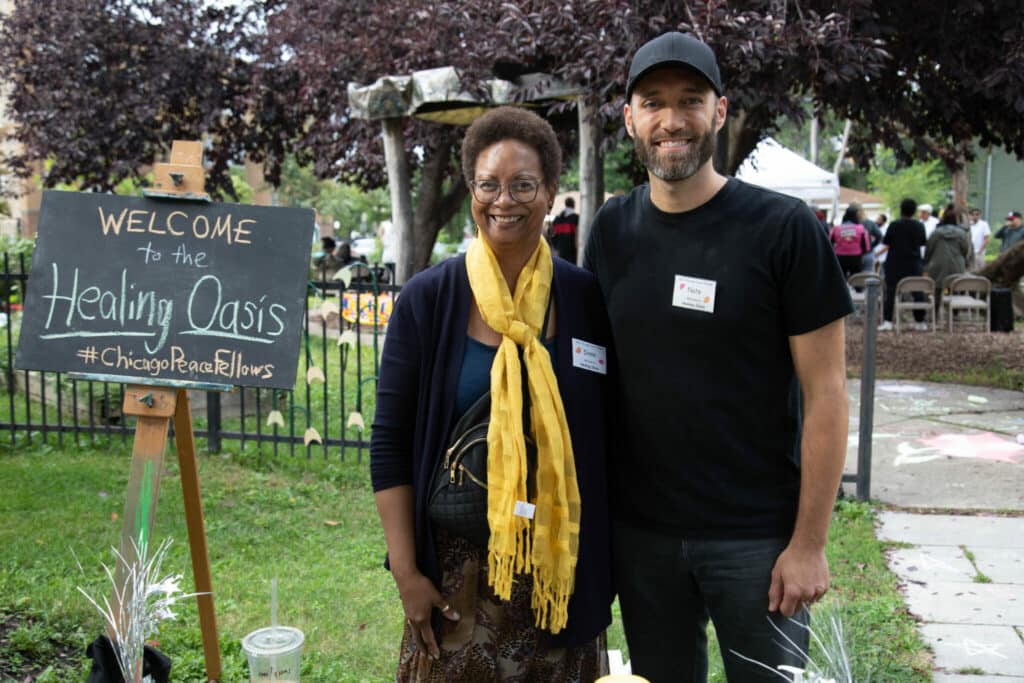
Summer Projects
Throughout their fellowship, the 2023 Peace Fellows had a series of planning meetings where they set the scope of their Summer Projects: determining which beneficiaries to target, choosing potential community partners, and drafting a program. After determining projects and team members, the Peace Fellows met on their own to plan.
The eight-member Healing Oasis team met consistently leading up to their event, which Antwan says played a large role in the success of the project:
”One thing that worked well was that we decided a planning time and stuck to it. We met consistently on the same day and same time and that helped us.”
— Antwan McHenry
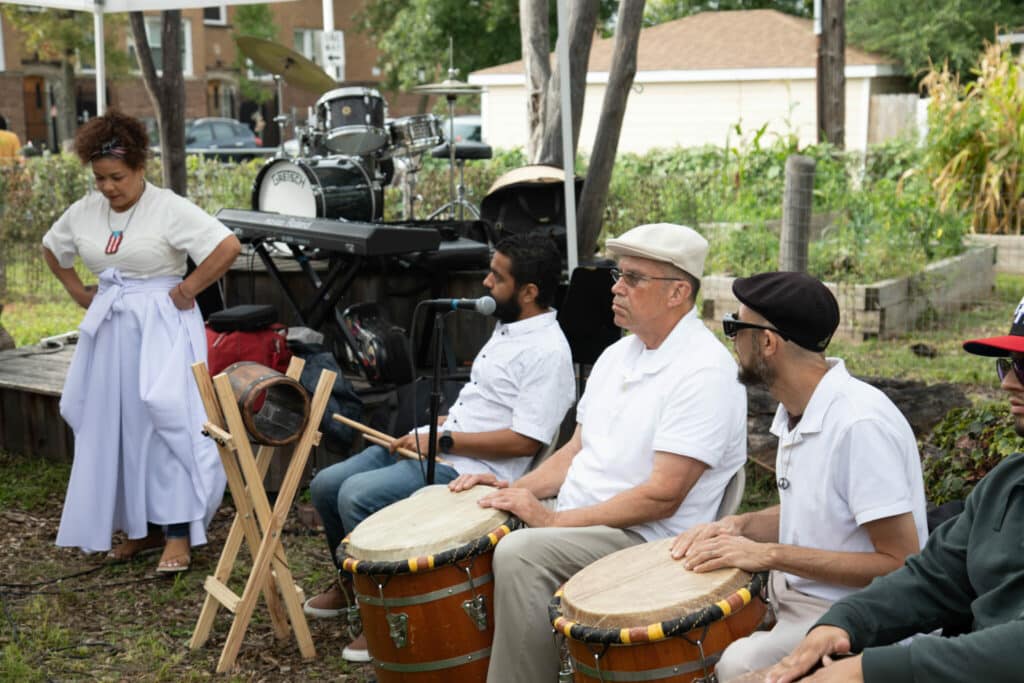
Community Connections
In their planning meetings, the Healing Oasis team chose to use the Children’s Garden of Hope as the location of the event due to its existing connection to the West Humboldt Park community. The Children’s Garden of Hope has a long history in the West Humboldt Park community. The Garden was created by NeighborSpace and West Humboldt Park neighbors to be a place where children can learn gardening skills and come together as part of the community to appreciate the beauty of growing things. Antwan has been on the board of Nobel Neighbors for the last five years, which have seen a host of improvements to the Children’s Garden of Hope as NeighborSpace has revamped it. Since then it has become a nexus for activities hosted by Nobel Neighbors.
The Children’s Garden of Hope also acted as a place that intersected with many of the Peace Fellows’ interests. This is in part due to Peace Fellows’ connections with NeighborSpace gardens, with Antwan acting as a steward for the Children’s Garden of Hope, Nate being involved in the Island Oasis nature play garden, and Yaritza working as a Stewardship Coordinator for NeighborSpace. This combination of community connections and the idea of having an outdoor space of health and healing made the Children’s Garden of Hope an ideal setting for the event.
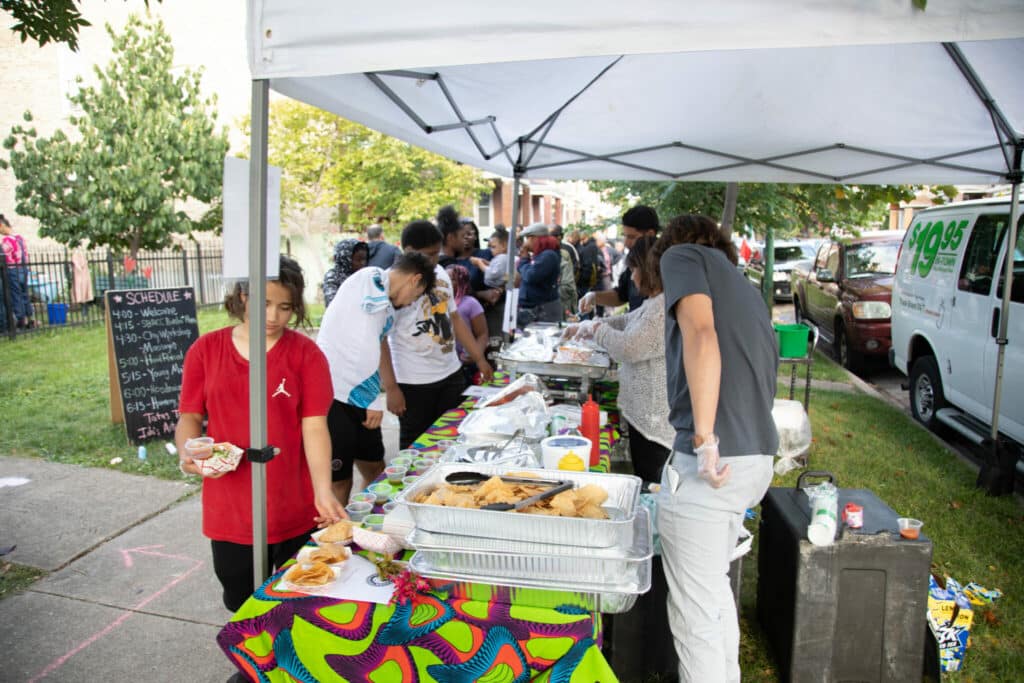
Space of Healing and Refuge
Healing Oasis featured live music and dance, spoken word poetry, a drum circle, food and drinks, and art and wellness activities. All of those programmatic elements were bound around creating a space of refuge and refreshment for members of the community. Healing Oasis provided a space of healing and refuge for both residents of West Humboldt Park and the greater Peace Fellows community. The Peace Fellows involved in planning the event were each able to tap into different assets within their community networks, bringing in drummers, jazz musicians, clay workshops, tea, and more.
“Everyone has lots of different skills, strengths, and connections. I liked how the whole event represented a collaboration between all of the people involved […] each of us was able to leverage relational connections to pull together the different pieces. It’s the kind of thing where no one of us could have pulled that event together.”
— Nate Tubbs
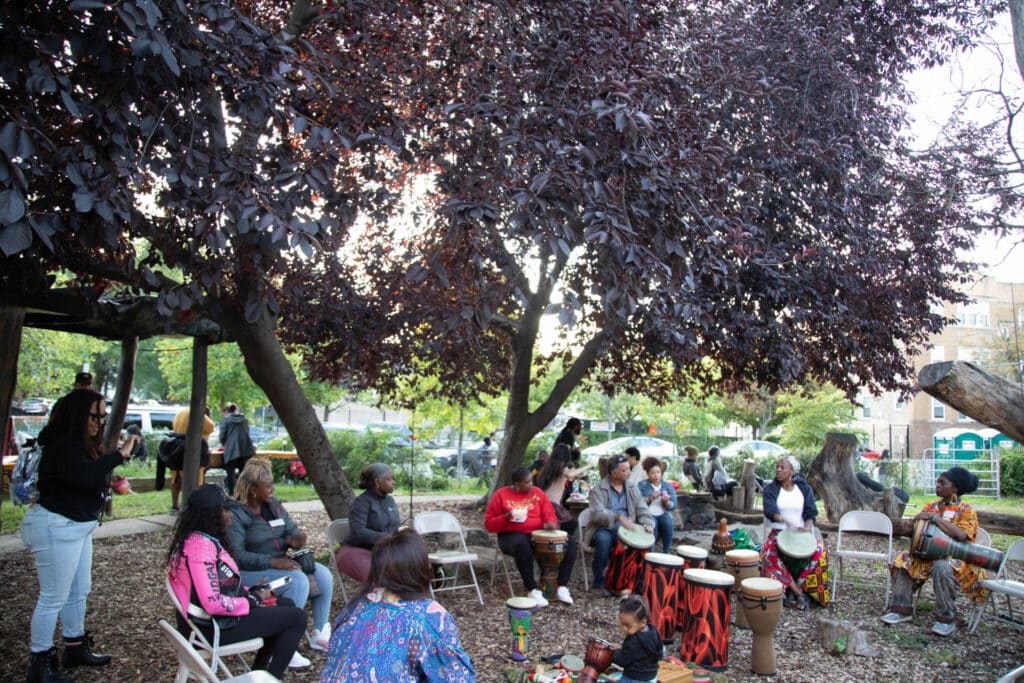
The investment of the 2023 Peace Fellows into Healing Oasis led to the event being larger than any event the Children’s Garden of Hope has seen recently and brought about deeper connections in the community. While the Children’s Garden of Hope is a regular space for Nobel Neighbors to host events, the larger scale of Healing Oasis attracted even more attention.
Antwan noticed that neighbors who had never been to the space were attracted by the scale of the event:
“I saw people from the community and word starting to pass. Word passed along and folks came by, plugged in, and enjoyed the space. […] New neighbors came down and mentioned that they didn’t know what was going on, but wanted to see.”
— Antwan McHenry
By tapping into existing assets, the 2023 Peace Fellows were able to activate a deeper sense of community in the West Humboldt Park neighborhood and provide members of the community with an opportunity to heal and rest.
An Alternative Mental Health Care Model Emerges on the Southwest Side
In August of 2023, Chicago Beyond, a philanthropic organization that invests in organizations working to ensure that young people and community members are free to live full lives, announced a $1.6 million investment in Centro Sanar.
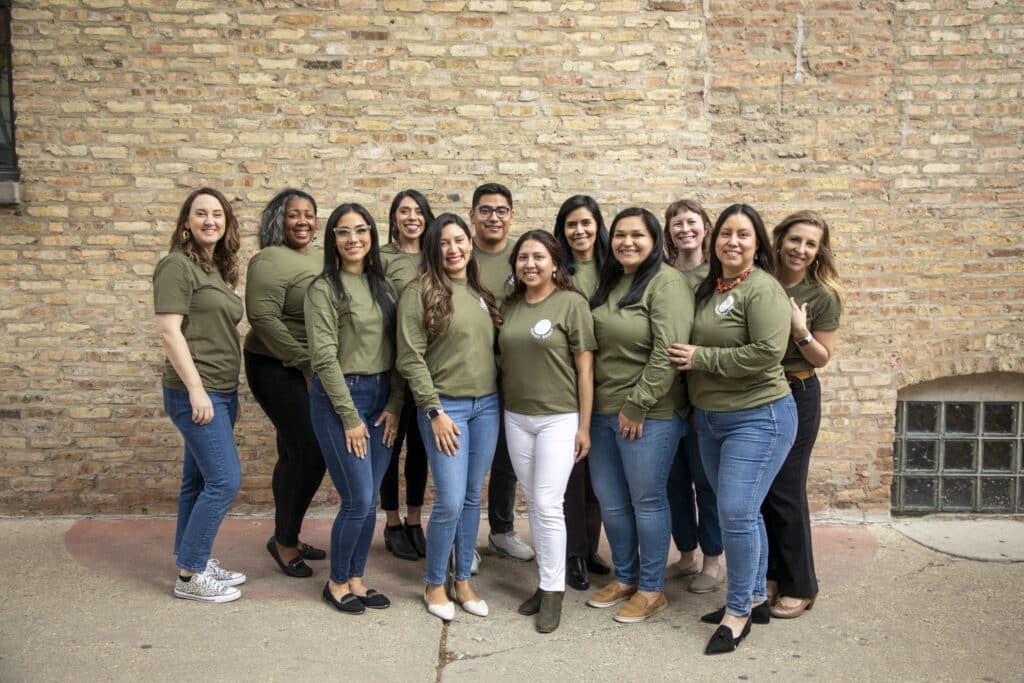
Centro Sanar, co-founded by 2022 Chicago Peace Fellow, Edwin Martinez, provides free mental health services to the southwest communities of Gage Park, Brighton Park, South Lawndale "Little Village," and Back of the Yards. This funding will help support Centro Sanar’s mission of addressing nationwide mental health service gaps in Latinx communities through a replicable model that acts as an alternative to the current mental health industry.
Chicago Beyond initially identified Edwin and the work Centro Sanar was doing through exploring the value of lived experience in community engagement and mental health services. A Growth Manager at Chicago Beyond found Edwin through an article in The Trace, a media outlet that reports on gun violence. As conversations between Chicago Beyond and Centro Sanar developed, it became clear that Centro Sanar had cultivated deep connections with both community members and organizations that serve the Southwest side. This ultimately resulted in a lasting partnership between the two organizations:
As an organization, Chicago Beyond deeply values Centro Sanar’s founders’ lived experiences and believes that in consultation with their partners and with those that they serve. Centro Sanar is serving the community’s needs, addressing systemic harms, and delivering a lasting impact.
-Lisa Caldeira, Growth Manager at Chicago Beyond
Centro Sanar is made up of social workers and therapists who have around 50 years of collective experience. When asked about the quick expansion of Centro Sanar, Edwin responded: “A lot of our success has been due to the community uplifting our work. We started off as volunteers in March of 2020 under the incubation of the Port Ministries. That provided us with a space to start the work and provide clinical services, which started to blow up in November of that same year when we started to receive funding. Fast forward to May of 2022, we were able to quickly launch a 501(c)(3) due to our relationships with stakeholders who were able to bring on state funding.”
By facilitating the development of lasting relationships between clinicians and community members, Centro Sanar has been able to expand its services rapidly and offer new forms of mental health services to an underserved population.
A Non-Medicalized Approach to Mental Health Care
Centro Sanar takes a non-medicalized approach to mental health care, which the team credits with the success of its programs. Edwin has seen mental health programs that take a medicalized approach fail due to the way their systems were funded and their way of reporting services to the government: “Our clinicians don’t have a fifty patient caseload, they don’t have a specific productivity guideline like in a medicalized system. They don’t have to do thirty five hours of clinical work for billing purposes. They are able to do community-based presentations and different levels of engagement so that they meet with community members when they are not in a state of crisis. This also means word of mouth referrals increase.”
The majority of Centro Sanar’s patients enter their care through word of mouth referrals, which means that neighbors and family members are sharing and promoting mental health care resources and are trusting Centro Sanar’s model of care. Word of mouth referrals also reduce the stigma of seeking out mental health care as friends and family members in the community encourage individuals to seek out preventative care prior to a mental health emergency.
By functioning outside of a medicalized mental health care model, Centro Sanar is also able to extend its mental health services outside of times of crisis. Whereas many medicalized mental health services are designed to tackle mental health emergencies, Centro Sanar expands services to preventative forms of mental health care. When asked what separates Centro Sanar from traditional mental health services, Edwin replied,
Consistency and presence. We’re one of the few organizations that provide free long-term care, consistent care that is not just twelve to twenty four 30-minute sessions over the course of six weeks. We’re doing what community members want, which is consistent and quality care. Even as a small organization we are making sure that we are providing long term service at different clinical modalities that tend to be inaccessible to our population and providing them in the language that they speak. That’s something that is often inaccessible in the current mental health landscape that we are in.
-Edwin Martinez, Executive Director at Centro Sanar
Collaborating to Expand Access to Services
One way that Centro Sanar is tackling the problem of helping underserved populations is by working with other organizations that complement their mental health services. For instance, their partnership with Port Ministries not only provides Centro Sanar with a space to operate from, but also allows for a co-location of services. Port Ministries, run by peer Chicago Peace Fellow Alumni David Gonzalez, offers services that complement Centro Sanar’s such as a free health clinic and an afterschool programs that can assist with child care.
Centro Sanar has also been able to co-locate with PODER, an immigrant integration center that works primarily with Spanish-speaking adults. PODER provides a space for Centro Sanar to operate from and also allows for a co-location of services. PODER offers programs that complement Centro Sanar such as workforce development and immigrant integration services. Offering behavioral health and workforce development with the same space increases the capacities of both organizations by streamlining referrals, access to care, and improving different areas of wellness.
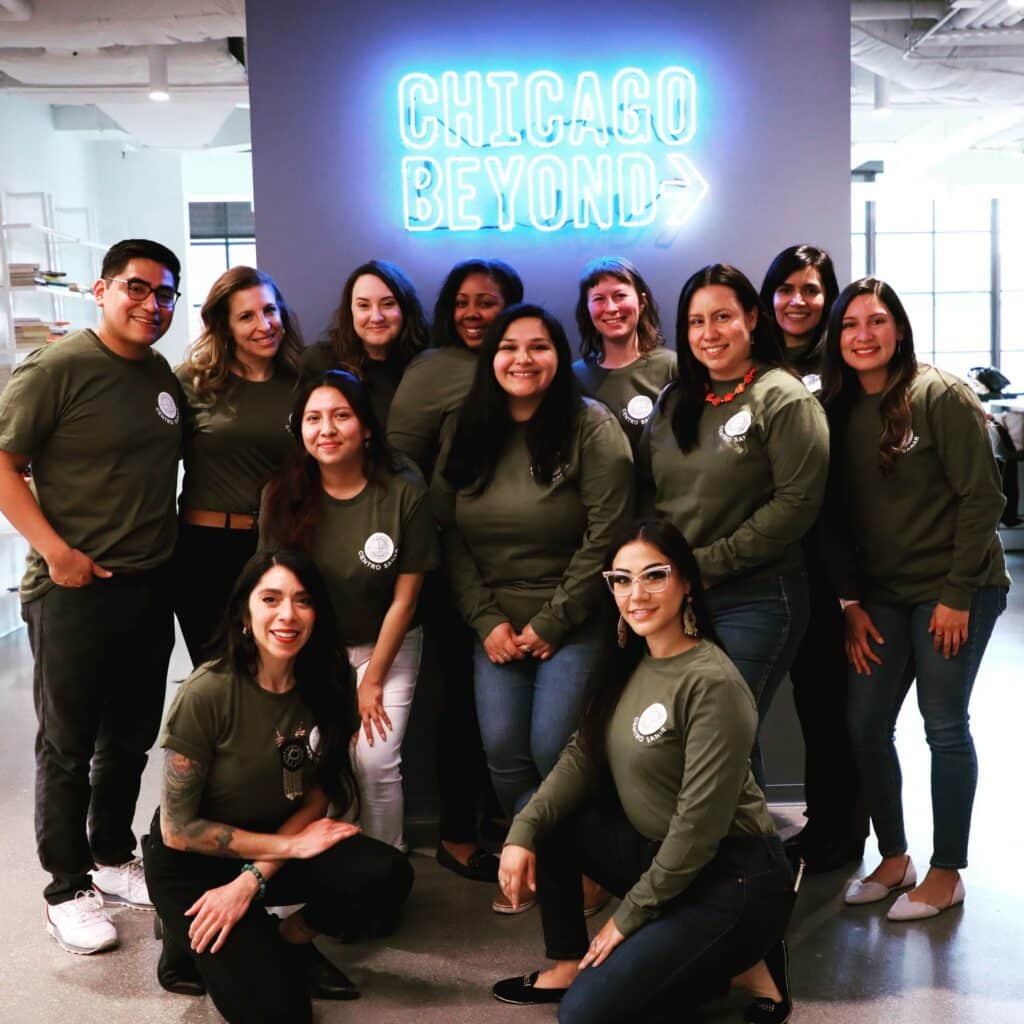
There is no shortage of work for Centro Sanar, they currently have a 10 month waitlist for individual therapy with close to 300 people waiting to receive services. This need is largely amplified by a systemic disinvestment of mental health services for BIPOC communities. As a young organization, the investment from Chicago Beyond will allow Centro Sanar to sustain their work and establish themselves as an organization. The funding provides financial flexibility for Centro Sanar to focus on what they know to be most critical for their organization and their clients. Financial security also allows Centro Sanar independence in establishing itself as an organization and figuring out what is needed in their infrastructure.
Both Chicago Beyond and Centro Sanar are especially excited at the prospect of serving as a blueprint for alternative mental health services in the future. Edwin in particular is hopeful that some aspects of Centro Sanar’s model of care can be extended into the public space, emphasizing that he would like Centro Sanar to, “give an example of an organization that is being creative, that is being innovative, and that is researching its work. This has always been a passion of mine, how can a public mental health clinic adapt this model to be implemented in its work.”
Central to both Centro Sanar’s growth and to its future is its ability to weave in partners to its mission and strengthen the community fabric. Lisa of Chicago Beyond emphasizes: “The team at Centro Sanar have carefully crafted combinations of ways to engage community members toward healing, not just towards dealing with instances of loss and grief, but towards a deep intergenerational wellness. For communities that have experienced generational harms and systemic oppression, receiving care that is long-term, free of charge, and accessible — culturally, linguistically and physically — leads to individual and familial healing, which in turn leads to community healing.”
Father's Day March Unites Englewood
On June 17, Mr. Dad’s Father’s Club held their fifth annual Father’s Day March in Ogden Park. Mr. Dad’s Father’s Club was founded in 2017 by Joseph Williams, a 2020 Chicago Peace Fellow, to get fathers and male-mentors actively involved in their childrens’ lives. Mr. Dad’s Father’s Club uses literacy and mentorship to nurture the social-emotional learning of Chicago youth so that they are better equipped to handle the world around them. This year, they held their fifth annual Father’s Day March, a family-friendly event filled with food, music, games, and giveaways.
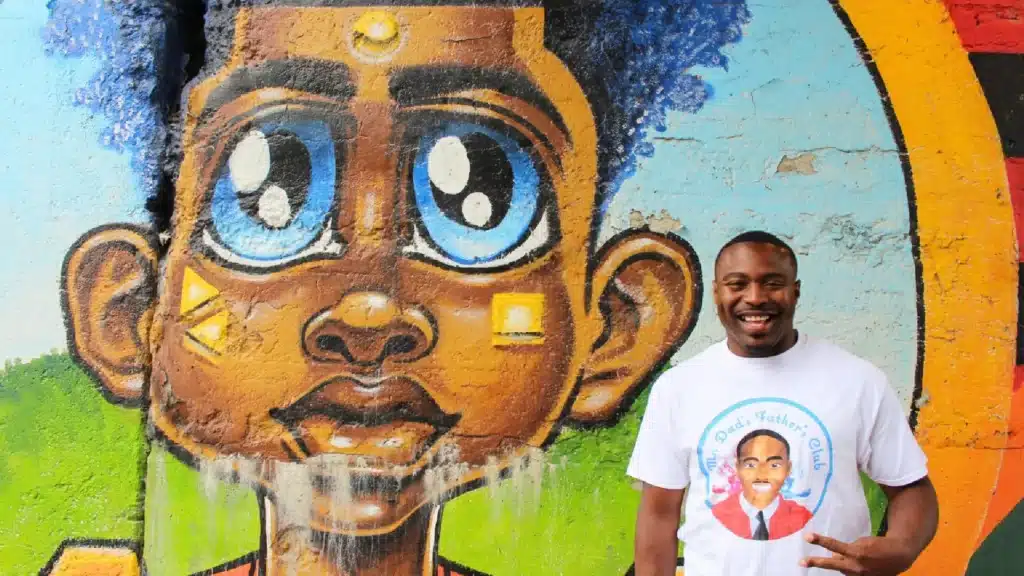
Community Involvement at the Father's Day March
Over the past five years, the Father’s Day March has grown in scale and has gained the attention of local businesses, community organizations, and political figures. All food, entertainment, and services at the parade were provided for free and local businesses donated meals, haircuts, and more. When asked about the development of the Father’s Day March, Joseph noted, “I will never forget when we started the event. We used to do it inside of the park and then we expanded out to the track field. We added dance teams, the Jesse White tumblers, face painters, and so on. Now it’s at the point where last year we had the mayor and superintendent come out, this year we had the superintendent come out again, so it has continued to expand.” As attention to the Father’s Day march has increased, the services provided have also grown in scale with more options for food and entertainment being delivered to the growing audience. In total, over 25 vendors came out to support the event and over 500 people attended.
We were really able to tie together businesses, nonprofits, elected officials under one event, for one cause. Every year we come to bring together peace and unity throughout the community… Each year I think the event might be more difficult to put on as it grows in scale, but it actually gets easier, because the more folks know about it, the more support we get.
Joseph Williams, Founder of Mr. Dad's Father's Club and 2020 Chicago Peace Fellow
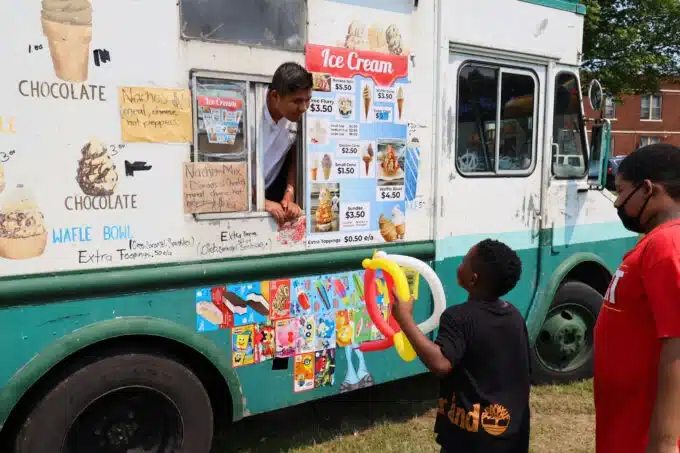
With over 500 people attending this year’s Father’s Day March, it became a site where members of the Englewood community could receive free resources and services while also spending time with their families. This year, Josephine’s Southern Cooking and White Castle donated food, while Michael Airhart of Taste for the Homeless cooked free meals. The Father’s Day March also distributed 50,000 free diapers and provided 100 attendees with free haircuts. By providing free food and entertainment, the Father’s Day March allowed family members to focus on connecting with one another in a fun environment. Attendees were also happy with the resources that the event provided. Tabling organizations provided opportunities for individuals to apply for jobs on the spot, receive phones or tablets with service for free, and other similar services.
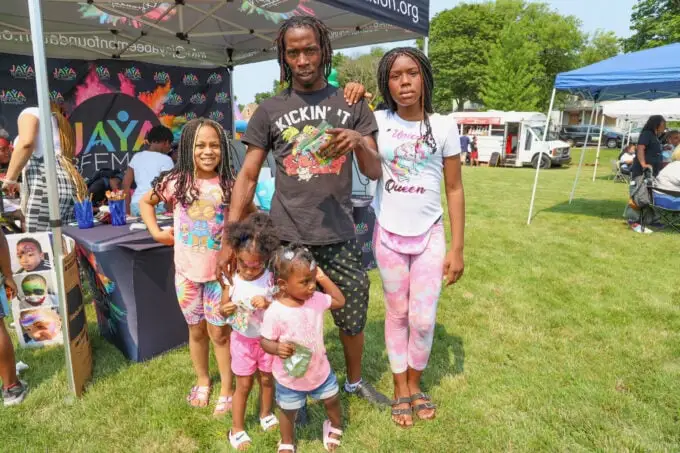
A central goal of the Father’s Day March was to bring attention to fathers’ continued involvement in their children’s lives. The event provided an opportunity to fathers and their children to relax and enjoy free face painting, balloons, an ice cream truck, crafts, and more. At the event, fathers approached Joseph and mentioned how they enjoyed the opportunity to not only spend time with their children, but also to have fun and to have a space in their neighborhood to relax.
For the future, Joseph imagines expanding the Father’s Day Parade to have themes, which would bring more attention to the event and complement the programming. He imagines bringing a carnival to the next Father’s Day March, providing rides, popcorn, ICEEs, and similar fare. As Mr. Dad’s Father’s Club continues to hold Father’s Day Marches for the Englewood community, they will continue to provide foods, services, and entertainment to the neighborhood. This celebration of community and family is the joint effort of community organizers, businesses, and other neighborhood organizations collaborating on a common goal.
A New Resource for Victims of Gun Violence
A new resource for families of victims of gun violence was recently released by 2020 Chicago Peace Fellow, Pamela Montgomery-Bosely. Her organization, Purpose Over Pain, launched a 24-hour crisis response hotline for people coping with the loss of a loved one from violence. The hotline is active from 7pm on Friday to 7pm on Sunday and can be reached by dialing 872-3CRISIS or (872) 327-4747.
Providing Crisis Support for Victims of Gun Violence
Since its inception in 2007, Purpose Over Pain has expanded from a small non-profit run by parents of victims of gun violence to an organization with full-time staff that work Monday through Friday. The organization provides positive development activities for children and youth, advocates for and promotes safer communities, and strengthens families by providing crisis support to parents or guardians whose children have been victimized. Most of Purpose Over Pain’s services are provided on weekdays, which up until now has left a gap in the services provided to families of victims of gun violence over the weekend.
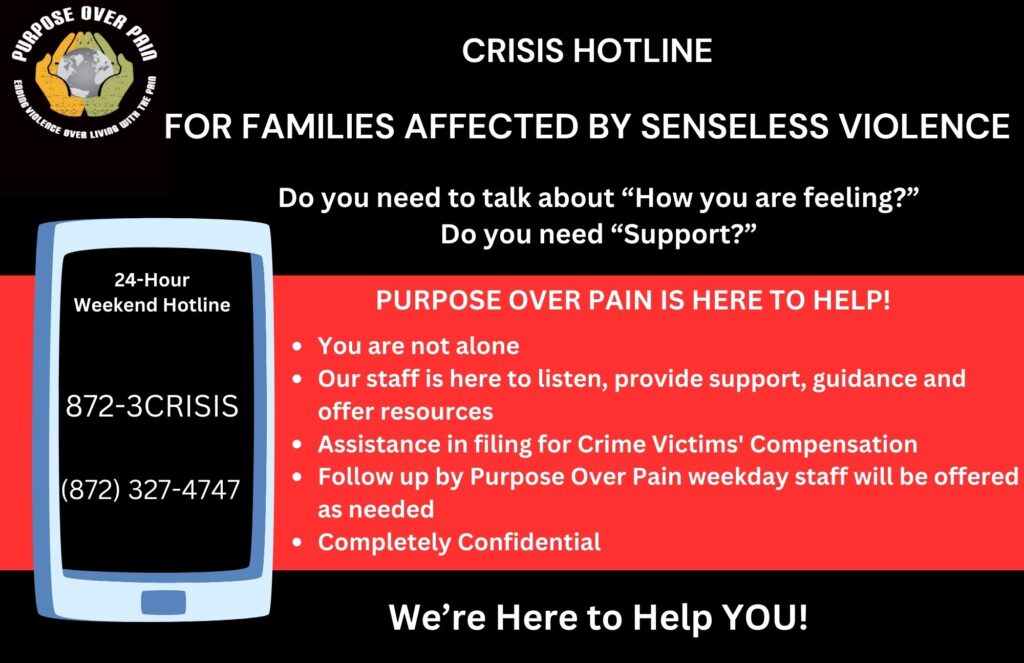
The crisis response hotline is intended to serve families at any point during the weekend, which is when the number of incidents tends to peak. Prior to opening the hotline, Purpose Over Pain would receive messages and calls throughout the weekend from people needing support after friends or family members had been shot. Pam explains: “Over the weekend, people struggle, because that's when the violence is extremely high. So, while we are available Monday through Friday, I wanted to be available on the weekends, but not my full time staff since they are survivors too.”
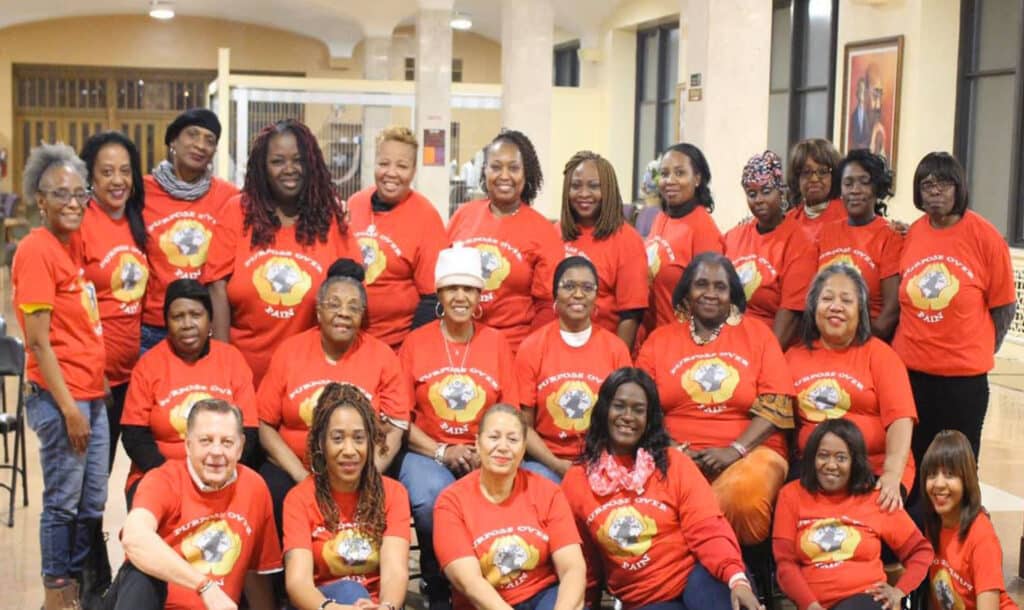
Purpose Over Pain hired four operators to work the gun violence prevention hotline over the weekend, so that Purpose Over Pain’s existing staff would not be overburdened. All of the operators have first hand experience with gun violence, having lost either children or relatives, and are trained to listen to and provide guidance to people dealing with a tragic loss. Pam describes the role of the responders:
We want to be there to support people and let them know that they’re not alone. Our staff is there to listen. Many parents have their children shot and killed in the middle of the night and might receive a call at 2 in the morning with the news. You can’t sleep after news like that, so we wanted to make sure that there is someone there to listen to them, to provide support, to provide guidance, and to provide resources.
Pam also works on the hotline covering for the other responders in case they are unavailable or if it is the anniversary date of their loved one being murdered.
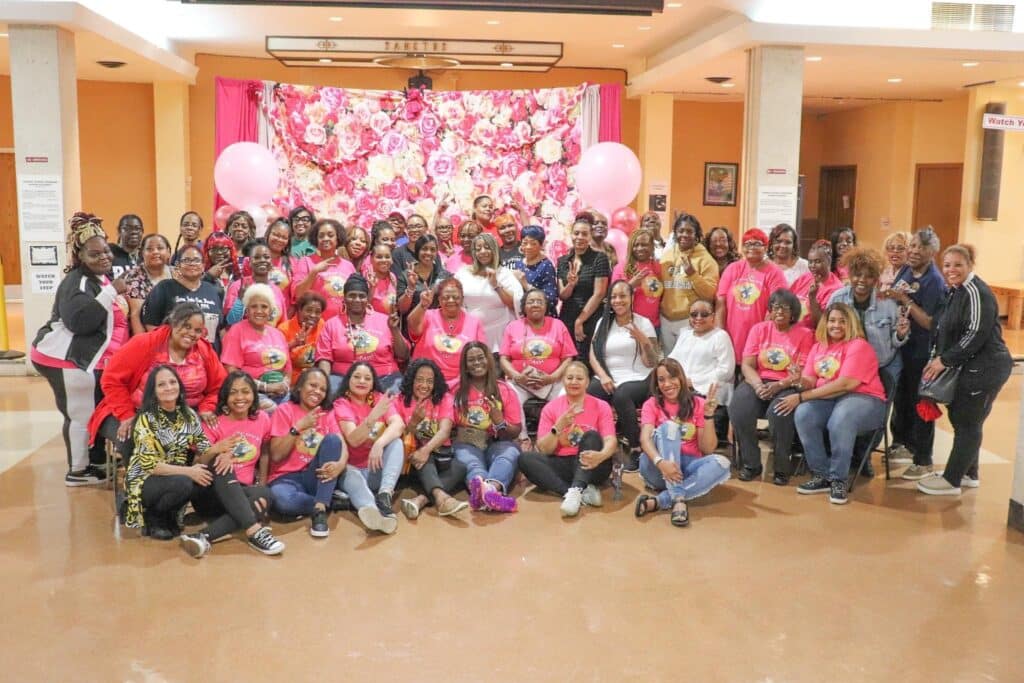
Resources Shared on the Hotline
Resources that the operators can link victims include support circles, counseling, financial resources, and job programs. Purpose Over Pain offers memorial services, support days, and mentoring sessions as part of its regular programming. Hotline operators can also link victims to outside resources. For instance, hotline operators often help victims fill out a Crime Victim Compensation Form. This form is part of the Illinois Attorney General’s Crime Victims Compensation Program which is intended to reduce the financial burden imposed on victims of violent crime and their families by providing up to $45,000 for expenses incurred by eligible victims as a result of a violent crime. Purpose Over Pain also has a full resource book that can link victims to programs that provide housing, food, clothes, and jobs. They network with other organizations, such as St. Sabina’s, so that they can connect victims with resources close to them and that are relevant to their needs.
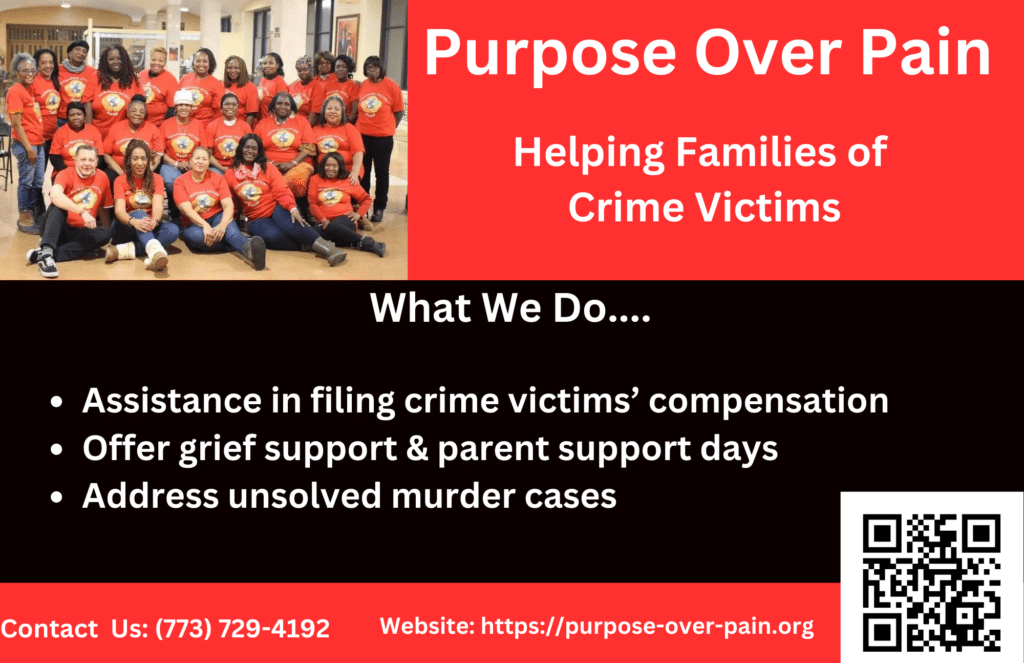
Purpose Over Pain’s hotline is the first of its kind in Chicago, previously there was no 24-hour crisis hotline for the friends and families of victims of gun violence. Now, victims can be supported by community members that have lived through similar experiences. Pam emphasizes, “When you call and they pick up the phone you’ll have a survivor, someone who understands what you’re going through. It’s not like you’re getting an automated message, you’re getting a live voice. I don’t want people to think they’re alone because they’re not, we’re here for them.” The Purpose Over Pain hotline has been created by community members for community members and will continue to provide pertinent and needed care.
West Garfield Park Boxing Club is a Haven for Youth
Brothers Tony and Sylvester Raggs recently started a youth boxing club in West Garfield Park. The club, Boxing Off the Block, is intended to teach young people from ages 13-18 discipline and the skill set of boxing. The club is located in Bethel Lutheran Church & School, and training is held on weekdays from 4pm-8pm. It is the Raggs brothers’ goal to encourage good habits in young people through the club and provide a space in which they can feel safe and have positive role models in an area where gun violence is a serious problem.
A Boxing Club that Provides a Safe Space for Youth
Boxing Off the Block serves as a haven for families in and around West Garfield Park. Tony, a 2021 Chicago Peace Fellow, has worked in violence prevention since 1981 and has served as a volunteer street outreach worker in West Garfield Park and West Humboldt Park. He and his brother Sylvester have worked alongside one another on projects working with youths and adults dealing with issues of violence and community outreach. They have used music and entertainment as a way to build community, with boxing later becoming an addition to that work. Over the course of the last two years they have found funding, trainers, and a space for their youth boxing club. They have been holding the club in Bethel Lutheran Church since October of 2022. Though the club is intended for teens aged 13-18, mothers and younger children also come to workout, box, and watch the teens spar.
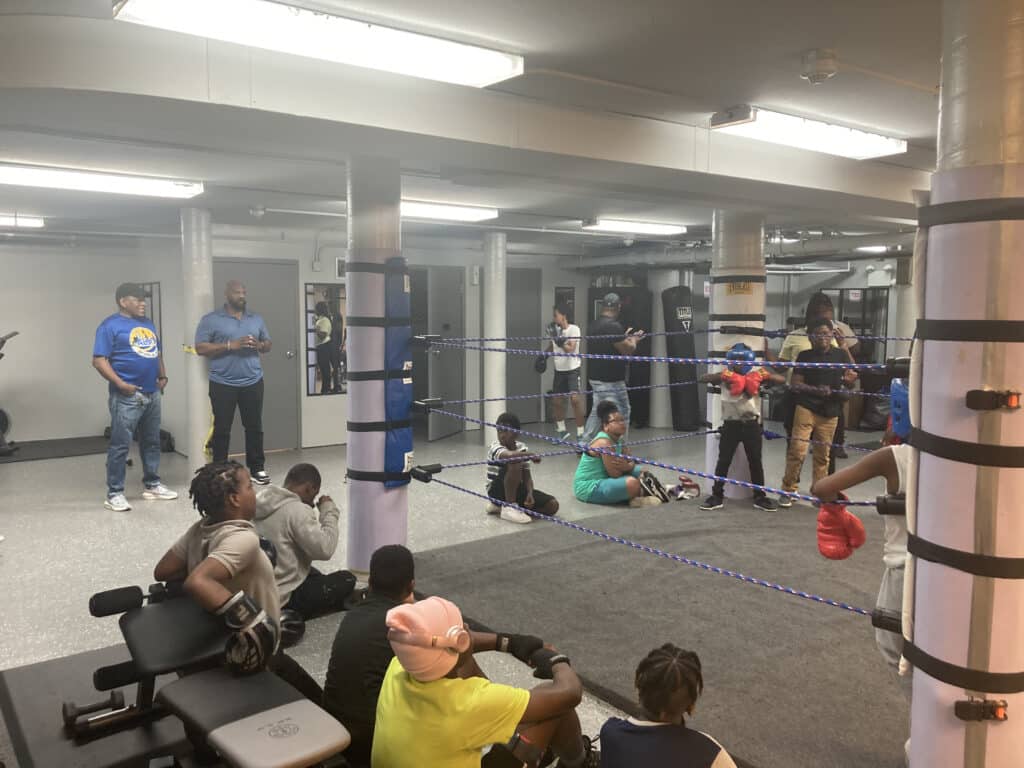
The club is stocked with workout equipment and trainers that provide the necessary tools for young people to learn boxing. The space includes a 10’x10’ ring that the brothers built themselves, punching bags, weights, and stationary bikes. They have hired two boxing coaches as well as a conditioning coach to train the young people who attend and they provide dinner for them as well. Activities are split between two groups with ages 13-15 training from 4pm - 6pm and ages 16-18 training from 6pm - 8 pm. Each group has around 15-20 young people attend.
Coaches Provide Mentorship and Structure
The coaches at Boxing Off the Block are often teens’ first mentors in boxing, providing them with training regimes and encouraging them to keep up their routines. The strength and conditioning coach, Travis Whittington, mentioned that he uses the discipline of training as a way to encourage good behavior in the gym, “when kids act out I ask them to do push-ups or run a lap so that they know what we’re here to do.” Travis provides personal coaching for the teens, giving them regimens to do outside of the gym. This is often teens’ first structured workout regime, so it provides them with a structure for building a habit of exercising.
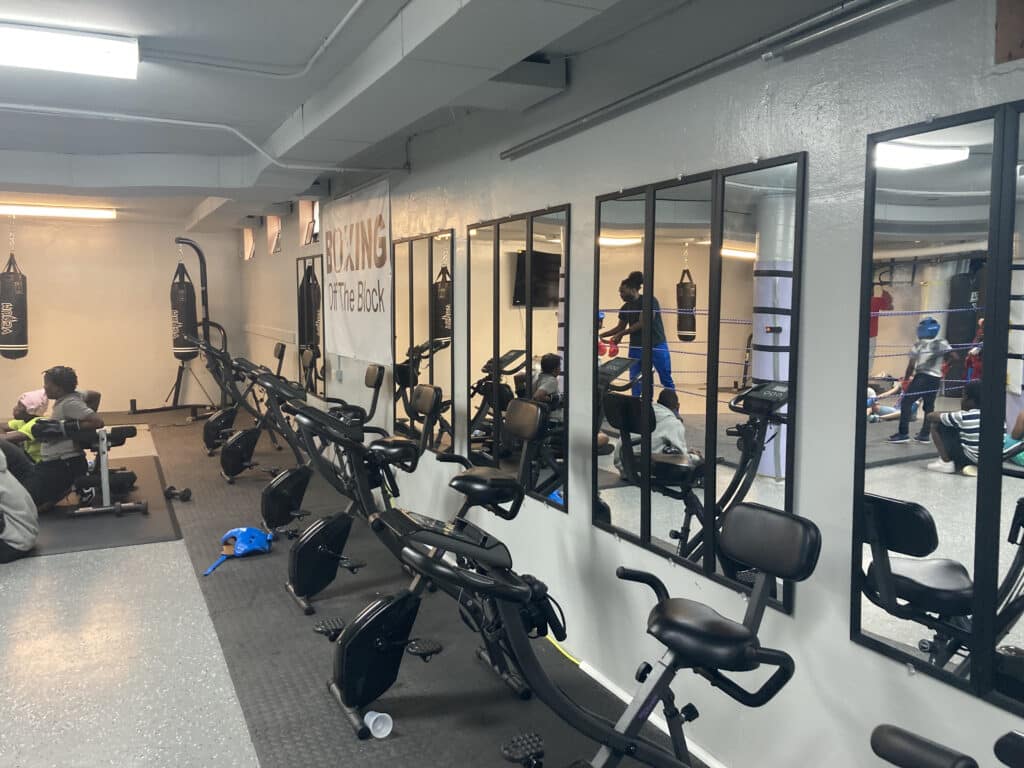
The two boxing coaches, Shawn Boyd and Levelle Whittington, emphasize the technique of boxing and its demands for control of the emotions. Shawn stresses that boxing acts as a form of stress relief and that a cool head is required to win rounds in the ring. He noted that the young people he sees excel at boxing are those who “are able to keep up a technique in a fight rather than resorting to street fighting.” Part of their hope in encouraging this kind of mindset in the youth through boxing is to help them deal with the possible threat of violence on the streets. They hope that by practicing the skill of emotional regulation in the ring, teens will be able to keep calm when confronted on the streets to know when they should back away or practice restraint.
Coach Levelle Whittington sees himself and the other boxing coaches as positive role models for the young people. He noted that many of the young people who attend the club have lost family members to gun violence and lack guidance. Boxing coaches can provide some direction and guidance by teaching the value of discipline, technique, and emotional regulation. Levelle also noted that boxing has the potential to distract from other more dangerous behaviors because it is something that can be framed as cool. Being cool allows boxing to compete with other interests, such as drugs or guns, and channels that energy into a positive direction.
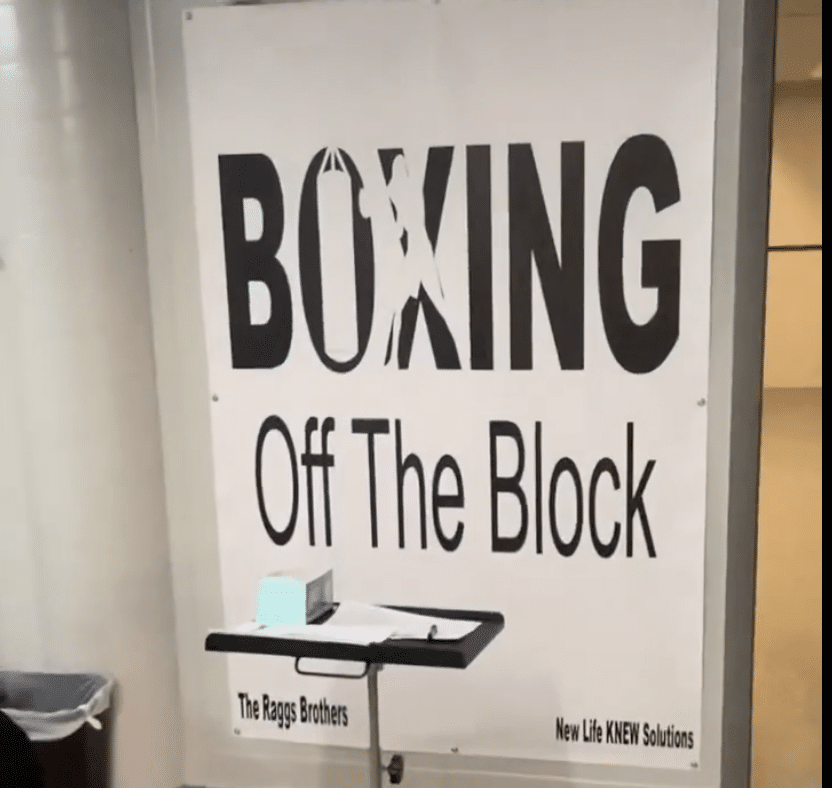
Boxing is not the only thing taught at Boxing off the Block, with a community of trainers, coaches, and students teaching the value of cooperation, self-control, and the study of technique. The club is quickly growing, with members from outside of West Garfield park also joining to learn the skill of boxing. It is the Raggs Brothers’ hope that the club will continue to gain both resources and members so that they can build community and encourage positive values in young people on the West Side.
